#this whole scene was the peak if cinema on my mind
Text
no bc the come out scene in the house of hades actually has no right to be this intense

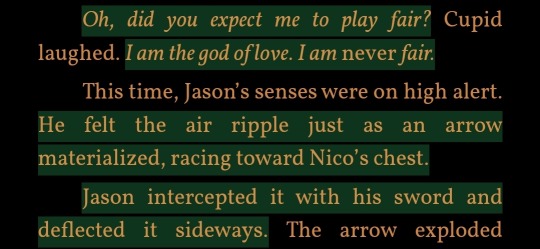
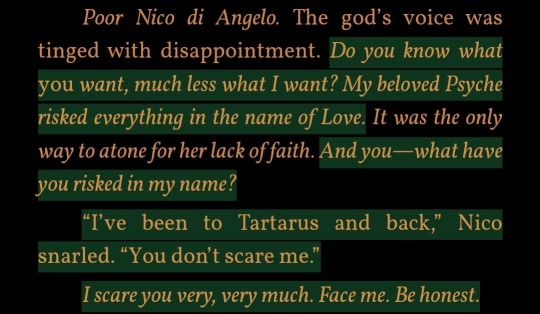
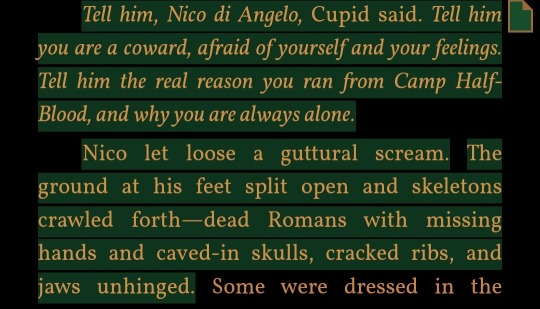

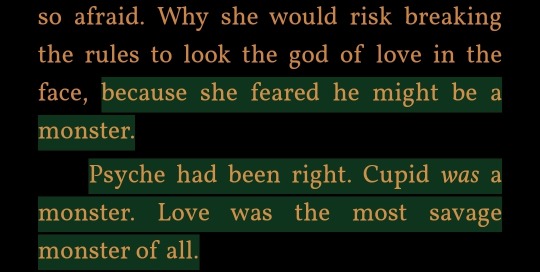

#EXCEPT DEATH IS SOMETIMES KINDER HE SAID#i remember that quote stayed w me for so long after reading this part for the first time like 💀😭#this whole scene was the peak if cinema on my mind#nico di angelo#jason grace#pjo#hoo#pjo/hoo#percy jackson#rick riordan#riordanverse#annabeth chase
881 notes
·
View notes
Text
Shout-out to the guy who was sitting next to me at the theater laughing such from the heart and genuinely having a good time
#and also my friend who was also laughing without a care in mind and enjoying the movie#thats why we go to the cinema#its not for watching the movie in big screen#its watching the same thing with others#having the same emotions#sharing the same laughter#hearing the guy in front of me going oof when the characters get hurt#seeing the person next to me leaning closer to the screen at the peak of the action scene#whole theater gasping at the same time#ITS ABOUT SHARING THE EMOTIONS IN THE SAME ROOM AND I FIND THAT BEAUTIFUL#i find human connections beautiful
1 note
·
View note
Text
Little moments that I love in Red White and Royal Blue. PART 6 (haha I'm going feral)
I know these scenes have been talked about like hundreds of times already but I still need to get the feels out of my system, plz bear with me 🙏😭
When Alex bends almost 90 degrees to take a look at Henry at the royal wedding. He seeks out Henry so much already it is so cute 😍 His commentary "He is so smug and entitled", "he's such a snob" and "I swear he's not 6 feet 2!" and yet we get this eager look from him 😝

Alex was MAD at Henry but he never meant for his suit to get ruined, he was so drunk he forgot that he had whipped cream all over his hands. You can see from his reaction that he realized he fucked up and says sorry immediately, even tries to clean the suit with his cream hands 🤣
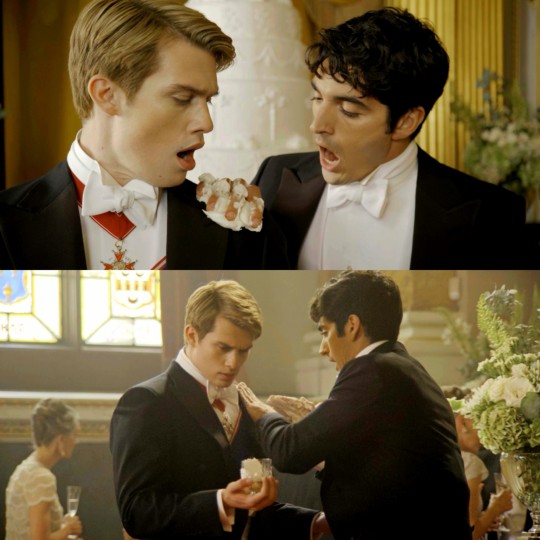
"Well now I feel like I need to apologize" - and I'm sure it took some pressure off of Henry. Wish we saw his reaction. I bet he was finally at peace knowing that Alex doesn't dislike him anymore or at least sympathizes with him.
The face Alex makes at his phone after talking to Henry, if only he could see it 😏 he LOVED every second of the call 😍 and he adores Henry but he hadn't realized it yet, my dumbass baby 🤧
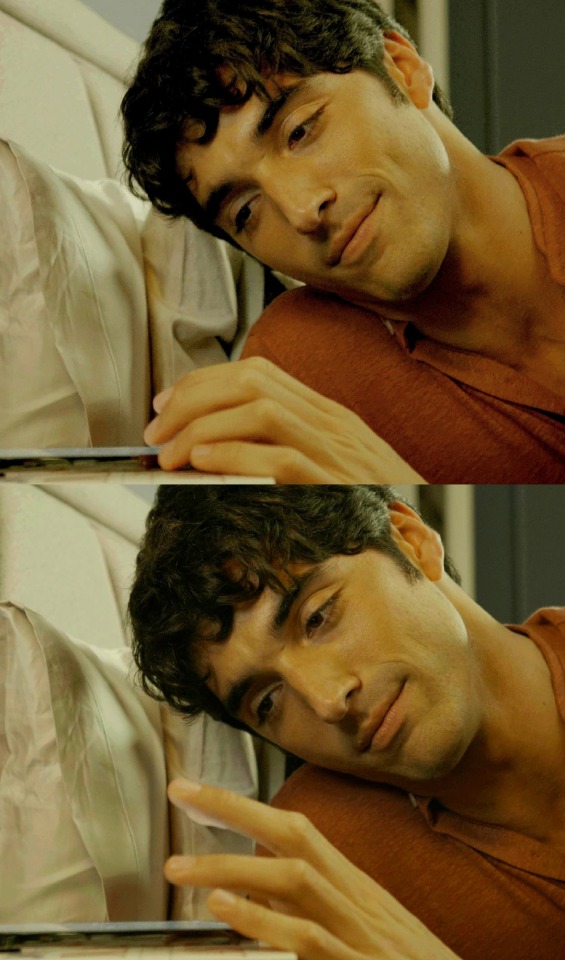
During the new years party, whenever Alex was physically away from Henry, his mind wasn't 😏

The way Henry grabs Alex's face and pulls closer while he kisses him 😩😍🦋 you can see the wrinkles on Alex's cheek.
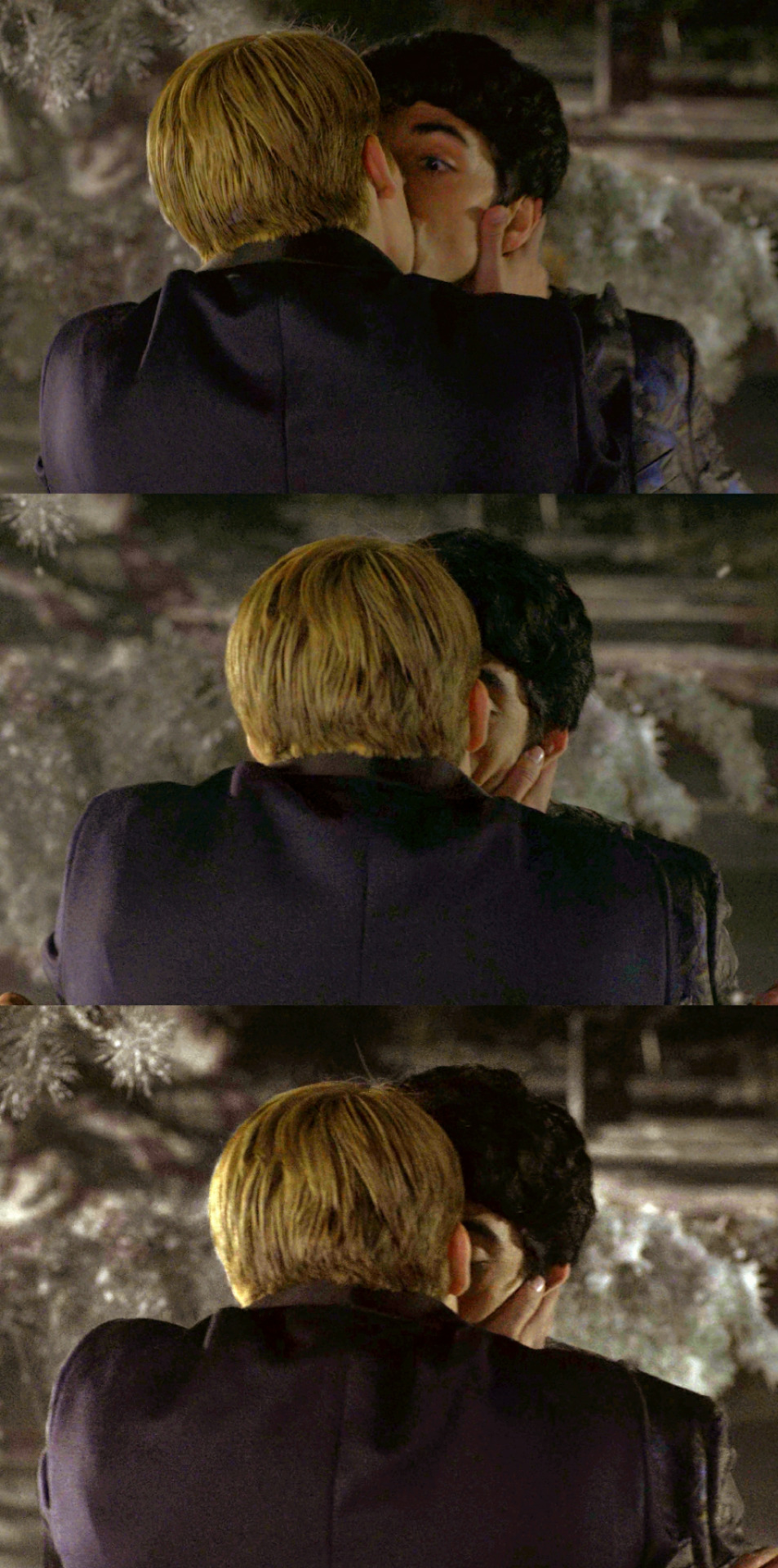
My boy (Henry) was really going at it and then Alex closes his eyes and gives in to the kiss 🥺
Henry giving Alex a look after his "the night is still young Ma!" he must be thinking "what exactly are your intentions?" 😝

Then he smiles both at the joke and at the prospect 🤣😏
Alexs come-hither look 👀👀 gotta mention Taylor, he was so good with his expressions here, (focus was on him in this scene, as opposed to the Paris scene where we saw Nicholas's mostly)
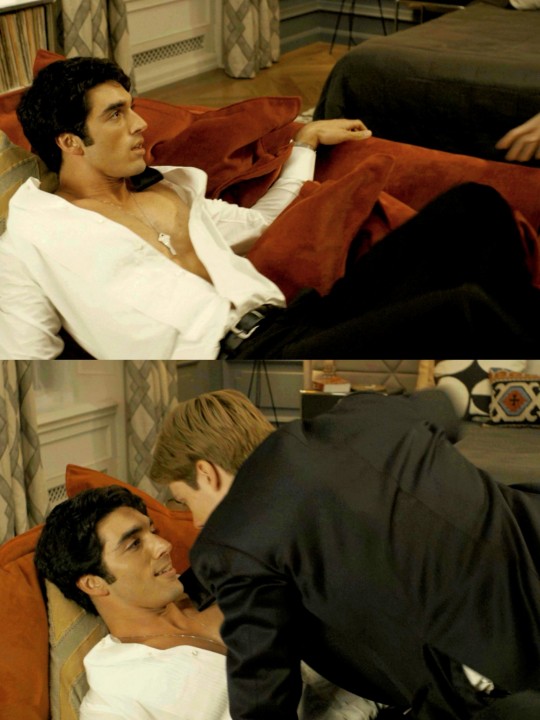
From the red room to Alex's bedroom - the whole thing is just so beautifully scripted, well directed, well acted. Cinema peaked here guys 😍😩 I have no complaints!
I love love how before leaving, Henry took one good look at Alex, took a deep breath, smiled and slowly turned away. Like he couldn't believe his own damn luck that he was just with Alex, after years of longing. And that Alex seems to want him too 🥺
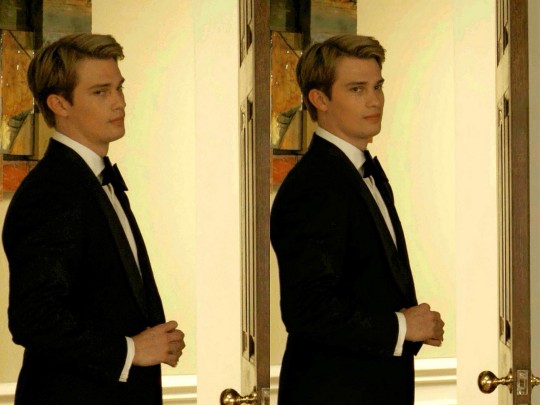
Henry struggling with his buttons and Alex immediately going to help him and their sweet little smiles in this scene 😍 And Nicholas and Taylors acting here, part eager, part excited, part nervous, part silly 😩😩😩 beautiful honestly 😭

Henry saying "oh and I told my sister" and Alex's "awe I didn't know that" and they both get lost into their own little world forgetting the tornado in the room that is Zahra. Boyfriends™

I almost cropped out Alex's butt here (which would be a crime btw) but I didn't and Henry's smile 😩😍 he is such a cutie patootie 😘
Part 1
Part 2
Part 3
Part 4
Part 5
Part 7
#Red white and royal blue#Rwrb#Firstprince#Alex x Henry#Alex Claremont Diaz#Prince Henry#henry george edward james hanover stuart fox#Nicholas Galitzine#Taylor Zakhar Perez#Rwrb movie
247 notes
·
View notes
Text
'In order for you not to feel anything from All of Us Strangers, you almost have to suffer from chronic apathy - or a coma. It's rarely classy to casually praise a film unless it actually deserves it, but All of Us Strangers demands praise. The director behind the film is Andrew Haigh (Weekend) who probably reached his creative peak with this film. If not, a bright future awaits.
The plot follows the reclusive TV scriptwriter Adam , played by the brilliant Andrew Scott , who lives a reclusive and rather lonely existence in London. After meeting their drunken neighbor Harry, portrayed by Paul Mescal , they begin a passionate relationship. Adam also encounters visions of his dead parents, played by Jamie Bell and Claire Foy , and relives moments from his past in his old childhood home.
The visions of his parents make Adam question whether several events or happenings in his life are merely a product of his imagination or actual reality.
The moment of redemption – the relief of reconciliation
The film deals with so many layers of the human nature that it almost feels overwhelming to untangle. Adam's loneliness and the raw questions surrounding his sexuality, along with the childhood trauma he experienced following the tragic death of his parents, result in many pieces of his emotional puzzle still missing. He seems to live in a constant limbo between his past and the ability to move on.
The scenes where Adam tentatively seeks absolution and comfort from his parents in his childhood home are both heartfelt and fragile. Everything that Adam experienced during his upbringing and in his adult life, the absence of his parents, he now seeks their understanding and blessing for.
The redemptive moments when Adam reunites with both his parents in understanding and forgiveness are a cinematic primordial force. The parents' inadequacy and misunderstanding of Adam's person at a young age is gradually sorted out, and as an audience you desperately hope that it will result in a satisfying climax.
At one point, Adam apologizes for constantly waking his mother every night to sleep in his parents' bed, to which his mother says – I'm sorry I didn't enjoy you driving me crazy.
In another strong scene, the family celebrates Christmas together. When the song "Always on my mind" plays, the mother and father spontaneously start singing along and quickly realize that the lyrics reflect their feelings and flaws towards Adam - a scene as beautiful as it is thought-provoking.
Two lonely souls – each other's medicine
The love story with Harry feels completely uncontrived, genuinely passionate and clinically pure. The line "I'll protect you from the hooded claw, keep the vampires from your door" from the song "Power of Love" by Frankie Goes to Hollywood is played when Adam and Harry first meet, and reappears later in the film. Harry symbolizes the piece that Adam is missing in his happiness puzzle and the power that protects him from that which saps him of joy and happiness.
Both Harry and Adam are two lonely individuals who are in equal need of each other's company and love in order to find belonging.
The film touches on many aspects of life that ordinary people reflect on all the time. The ability to dare to let someone into your life and let this person help you, love you and challenge you. No one wants to go through life and only be a stranger to their surroundings. Interactions with strangers can be paths to self-realization and personal growth if we only learn to open our hearts and minds to the unknown.
The acting performances, script work, music score – yes the whole movie overall, leaves me with a feeling of gratitude as I leave the theater. A few times in my life, this feeling has appeared after a visit to the cinema. To be able to experience this from time to time is a blessing - so a standing ovation from me, thank you.
#Andrew Scott#Andrew Haigh#All of Us Strangers#Weekend#Paul Mescal#Claire Foy#Jamie Bell#Always on My Mind#Pet Shop Boys#Frankie Goes to Hollywood#The Power of Love
2 notes
·
View notes
Text
The Five Nights at Freddy's movie.
Holy SHIT!!!!!
I saw it on Thursday, and rewatched it with friends just tonight.. I can safely say EVERY SINGLE THING I HOPED AND PRAYED FOR IN 2015/2016 WAS IN THIS MOVIE AND MORE
I genuinely could not be more satisfied with it aside from them adding a power-outage Toreador bit.
SPOILERS BELOW!!!!!!!!!!!!!
!!!
!!
!
Holy holy fucking shit in hell I was waiting and hoping for a Springlock Scene in any capacity outside the original minigame for EIGHT YEARS. And I finally got it. In a FNAF MOVIE.. played by Matthew Lillard.
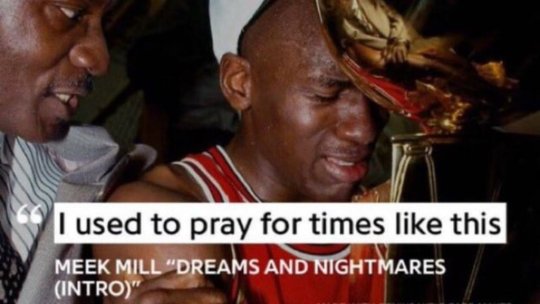
Genuinely peak cinema. The credits of the living tombstone's fnaf song made me almost weep, followed up by THE MUSIC BOX with SAVETHEM minigame audio... except now it reads C O M E. F I N D. M E.
Come find me?? Overlayed on the puppet's music box?? With a BALLOON BOY JUMPSCARE post credit scene?? The THIRD APPEARANCE of him in the film???
Genuinely I love it so much I gotta analyze some things quickly.
1. The hole which the Cupcake bit into Afton's suit directly creates the gut-window we see in the games
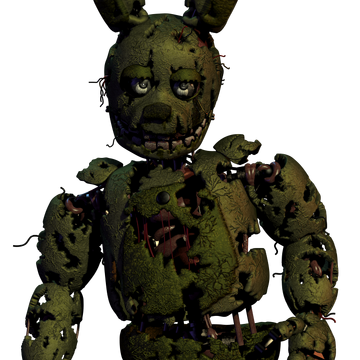
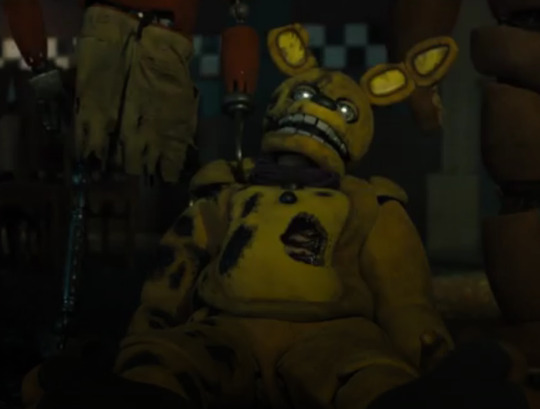
2. When Spring Bonnie himself shows up, the INSANELY BADASS theme rises four times. Four main kids, plus GF.
The four rises of the music are replaced by a quiet stringed instrument, which is a polar opposite to how the Missing Children act. Four quiet individuals and a talkative fifth, contrasted by four loud crescendos and a quiet followup mediator before the Fazbear's Motif kicks in again. Because Afton's influence makes the kids act the opposite of how they usually would. His presence drives the usually kind spirits to madness and gives him total control to manipulate them horribly its so GOOD
TO SUMMARIZE- I love this movie with my whole heart and it's absolutely everything I could have ever wanted from a Five Nights at Freddy's film.
Also William Afton is incredibly badass as Spring Bonnie. My 8 years of loving his character design, and almost daily routine of roleplaying as him at recess in third grade have both culminated in finally seeing my favorite character from the franchise in action before suffering the violent mutilation I've been hyping up in my mind for almost a decade.
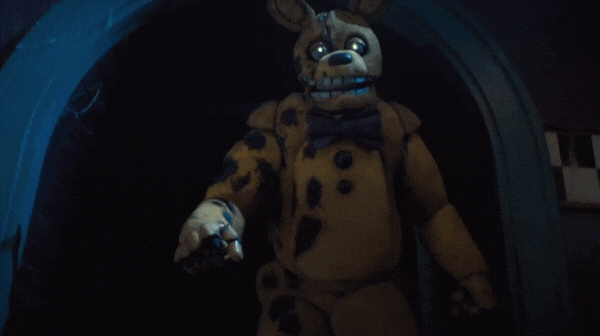
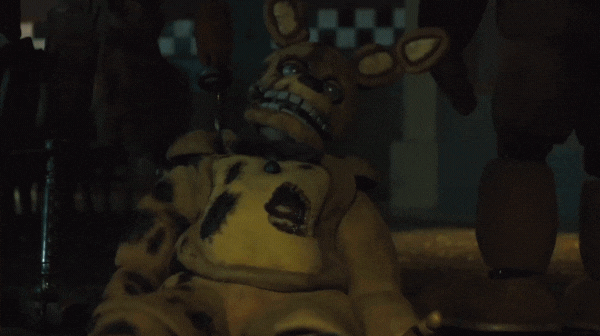
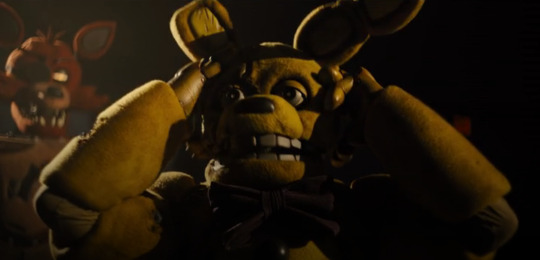
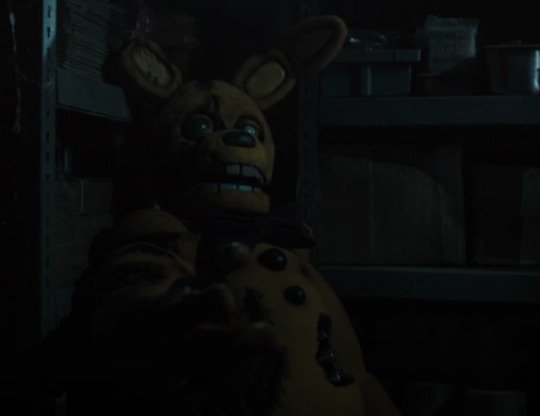
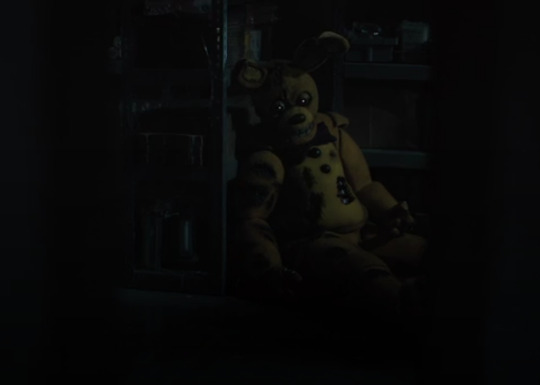
Remember... he always comes back.
3 notes
·
View notes
Note
Movie Asks:
37, 60, 69 :)
37. Movie quote that will always make you laugh?
Honestly the scene from Twister (1996) where Bill and Dusty stand outside of the dinner and Bill's like "Going green" and Dusty just says "Greenage" always cracks me up. There are so many lines in the movie that are trying to actually be funny but this single dialogue always has me chuckling. It's also living in my mind rent free whenever I'm on storm chase and encounter turquoise or green hues in the sky. (but with far less time to ponder over it as it usually means we have to find suitable cover for the incoming hail)
60. Most visually stunning movie you’ve seen?
I've answered this already but I will think of which Crowe movie I specifically like in terms of visuals.
[thinking hat]
While I do not really like the colouring of Cinderella Man (2005) in every scene, it is one of the movies I am very impressed by when it comes to how they shot things, I suppose. I just really, really like the way they did the fighting scenes. They feel realistic, I love the blurred effects and men covered in blood are just peak cinema. I also just really loved watching the making of of this particular one.
It is not a movie I would freezeframe every still of, but purely based on technicality I really like it :)) but there are a lot of pretty movies with Russell in it. <3
69. The main movie you remember from your childhood?
Twister (1996), Dante's Peak (1997), Mrs Doubtfire (1993) and Bean (1997). Maybe this explains why I love 90s movies so much. :^)
and I also have such a distinct memory of watching Prisoner of Azkaban (2004) with my cousin and my brother at my grandparents farm. I can even feel the texture of their carpet and smell the kitchen/living room smell and imagine the fabric from my grandfather's chair. I have not rewatched any HP since the whole JKR thing, but in a way I am not... opposed to reclaiming this large part of my childhood - but just in private. Especially the first two movies have offered me a lot of comfort and my crush on Alan Rickman as Snape was my very first movie crush. (That also explains a lot)
3 notes
·
View notes
Text
"on veterans day after the production show the cruise director stood on the stage and asked the veterans in the audience to stand and be applauded. they did; there were many. many old men standing and smiling, and the applause was deafening.
two films: matrix revolutions last saturday (i wont get into it, but man! what happened to the buddhist promise of the first movie? the enlightenmnt allegory, the idea of awakening into the real world, of realizing that capitalist western culture is just an illusion? why give that up for some c- high school meandering on determinism and some easy christianity? i still had fun though. especially liked bad guys on ceiling, good guys on ground. anyway.) and a reviewing of the two towers (again, i wont get into it, but man! the number of contrived dramatic peaks and valleys made me feel christmas candy sick after a while) in the cruise ships cinema earlier today. in both, scenes of men preparing for war. the masculine shouts of men ready to die. the dramatic placement of a helmet onto a frightened teenaged head. et cetera.
on the ship, fat men, drinking, rude, poorly dressed.
on land, thin men, sweating, fearsome, barely dressed.
on the television, bush in britian, defending war. in the staff mess, a collective cosmopolitan grumble.
two books: franzen's the corrections (a book i have avoided for a long time because of its ubiquity; every san francisco party i go to has it there on the shelf, tucked between manufacturing consent and lonley planet: south america. but i liked it), which discusses mental illness in the setting of domestic suburbia, men in depressive states, and thoreau's walden, which discusses individuality and the dangers of blind adherence of custom. "i have never learned anything from old men." what a badass he is! what a man he is!
jts, paraphrasing robert bly: the soft man, the sensitive man, out of touch with his primitive masculinity, with his roughness, lust and bloodthirst.
mcw on masculinity: "the best thing to do to a group of men is put them to war, give them a task, a goal. heres a gun, now go!"
a book from my childhood, real men dont eat quiche. the sensitive overcompensation of the alda male.
on the ship: complaining. companing about bureacracy, about vapid things. men whining over fingernails, life and death unknown.
a song played tonight, in the jazz club, trio: when i fall in love (...it will be forever). i play very sensitively.
jem, drunk, on a college stoop, lamenting the shallowness of academia: "lets get a gun. lets get a gun."
pk, (what is your middle name pk?) on the subject of the hypothesized new american revolution: "historically, people dont rise up unless they are starving."
all of these things.
they fit together, i know they do. here we have men who have fought in wars. here we have men who have not. not just the individuals, i mean the whole group of men, my peers, my great wonderful male friends spread out over america, who have never known the terror of actually having their lives in danger. and our minds reel and rock! our minds shake with religion and politics, wth art and love! going crazy with metaphysical speculation and women and god and music and wind. crazy. the world seems paper thin at times. sometimes i cant tell if im waking or dreaming. sometimes i get sad enough to shake.
but in contrast, in contrast this all seems rather ridiculous, and i wonder if my generation hasnt missed out on something essential. give me a gun. i dont want it. now listen- i dont want it. but maybe i need it. to understand something real, with consequnce that i can biologically feel, with terror running through me that will silence my intellectual nosoul and bring me back to my evolutionary assignment, to live at all costs. i dont want it, i think thats part of it, not wanting it but doing it anyway, because choice is taken from you. because your family will be killed. not iraq or vietnam; more like wwI or II (for europeans), the civil war. our production show "spotlight broadway!" ends wth a les miseables medley. the french revolution. theres a fucking war. "will you join in our crusade, who will be strong and fight with me?". those kinds of wars, where its in your backyard.
i know im sitting here glorifing (isnt there a y in that word?) war from a pretty plush position. what the hell do i know of it. i wouldnt be saying this if i knew. but thats the point, thats the point. my plush position. its despicable, its fat and slovenly, its unmasculine. its complacent. so much of myself and my geneation has become complacent in action, filled with words of questioning spirit and political anger and energetic connection but lacking in the barbaric action that creates history. the emails i get, the pleas to write to my congressman, sign this petition. a lack of action. a lack of violence.
so maybe i need a gun and a war.
but i wont, i know i wont. because im not hungry, im happy, happy with my eyes closed. and the radical left will never rise up in violence, and the fat men on the ship will drink, and articles will be read, and love songs will be played, and acid trips will show us the stars inside of ourselves, and it will be fine and beautiful and under no threat.
and maybe this is wonderful, maybe that absence of terror is a vital step in evolution, maybe grassroots campaigning will actually get compassion into office, maybe peace is a real and viable goal. its a hard call though. it has no historical precedent, this life without fear.
perhaps it will end in global enlightenment, the men in their indian shirts smiling and dancing.
perhaps it will end in global holocaust, the men in their college tshirts picking radiation boils off of their bloated bellies.
i suppose we will see."
Dave Malloy, 19 November 2003
#pointless dave malloy#dave malloy#i wish i had a show of his i could direct this towards#maybe Pierre#my friend fight and leads i sit at home and read?#ah anyway#edit: aha!#there is a bit of this in Ishmael#that longing#that romanticisation
1 note
·
View note
Text
*clears throat*
Guys, in the spirit of the anniversary of ATLA finale, I just want to say what the final Agni Kai means for me as a scene for everything that it encloses.
Zuko was the first character that I saw in media who came from an explicitly abusive family – like me. Seeing him having that cathartic moment battling the ones that looked down on him with all his strength after being called weak and disgraceful… it gave me hope that one day I could do that too.
And Katara was the first brown-skinned girl (like me!) who I saw in media. I felt so empowered when she was the one to ultimately win the battle and save the ones she cared about!
As a person that struggles with perfectionism and mental health as well as complicated relationships with her parents, I could understand Azula’s breakdown. I felt identified by it. I never could really describe what it felt like when I reached one of those moments when my mind was just too much of a dark place, but seeing Azula crying was too much of a graphic representation.
And apart from all of that, all of the romantic/dramatic atmosphere for Zuko and Katara’s relationship is still one of the best that I’ve ever seen in fiction. The light of Azula’s lightning reflecting in both their faces, their facial expressions:
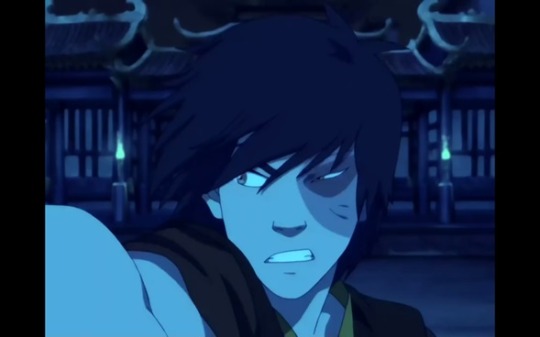
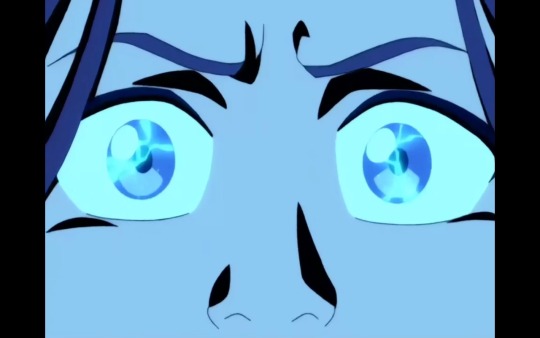
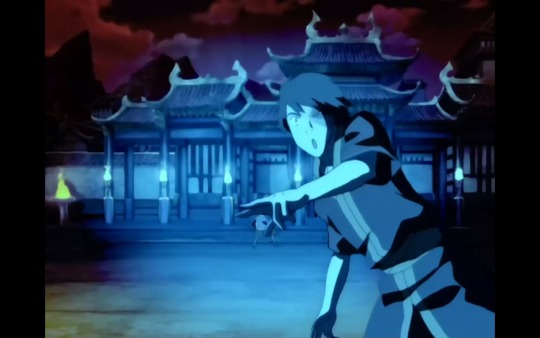
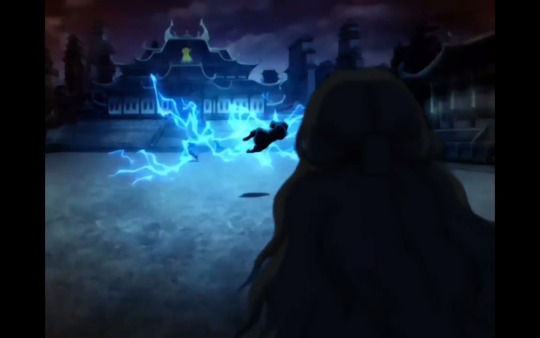

The music, the colors, the sound of their voices. (This is the part when I’m glad I watched it in Latin Spanish dub. I love Dante and Mae with all my heart, but if you thought Zuko and Katara’s lines sounded pained in the OG dub, in the Latin dub they’re just shattering!) (I swear, every time I see it, I can hear Katara’s throat scratching itself when she screeches Zuko’s name!)
Maybe that moment is so powerful because the set up for a romantic relationship between Zuko and Katara is so well-done and deep and meaningful by itself, but everything is just so beautiful it almost makes me tear up. Even when they weren’t canon, Zutara made me realize many things about love and feeling loved that I haven’t forgotten ever since, and this whole scene is just peak poetic cinema.
I solemly vow to always be a fan of Zuko and Katara separatedly and together, and to keep improving myself as a writer and an artist to keep coming up with content about them, so everyone that sees it will love them too! (Better if it has some Azula-inclusion!)
131 notes
·
View notes
Text
Chapter 12: Three Men in a Boat [TFP 2/3]
[This was completely missing from my tumblr, via every search function and everything! So I’ve reuploaded - thanks anon for letting me know!!]
This section of the meta is going to deal with the events at Sherrinford – I’ve broken TFP up into three sections to try and get the most out of it. This isn’t just a read through like the first part of the meta, it has a specific structure, much like Eurus’s trials for the boys, so it’s really important to take this bit in one chapter. My hypothesis is thus – that each episode of s4 has been a different obstacle to be broken through in Sherlock’s mind, and that each of them is represented by one of the different Sherrinford tasks. It’s essentially an illumination of Sherlock’s progress through his mind – but it’s set up by Eurus, who is Sherlock’s mental barrier, so these are going to represent Sherlock’s darkest fears about each of the obstacles. Ready? Let’s go.
We take up the episode at the pirate hijacking, which is quite BAMF, but also illuminates a couple of things that we should bear in mind going into this episode. The first is that the transition from a blown up Baker Street to Sherlock and John hijacking a boat without a scratch on them is absolutely bizarre and leaves SO many questions – it’s dream-jumping of the most obvious kind. The second is that water has played a long role as a metaphor through the show, particularly in the EMP sequence, and it’s climaxing now – we are in the deepest waters of Sherlock’s mind.
Mycroft and John working together in the disguise sequence is metaphorically lovely – in the Oscar Wilde scene of the last part we saw Sherlock’s brain and heart finally coming together, and here for the first time they’re working together to give Sherlock the ability to go and confront Eurus. This is what makes Mycroft’s line so powerful. He says:
Say thank you to Doctor Watson. […] He talked me out of Lady Bracknell – this could have been very different.
Comic throwaway? Maybe. But given what we know about Lady Bracknell from the first part, this also has a more powerful meaning – heart!John finally stopped brain!Mycroft from being an obstructive force in Sherlock’s psyche, and they started working together instead to save him. This could have been very different is far more loaded than it sounds. All this whilst creating an image of Mark Gatiss as a Victorian aunt – wonderful.
When we first meet Eurus proper, her similarity to Sherlock is striking. She plays the violin – this isn’t a Holmes thing, because Mycroft doesn’t – it’s Sherlock’s motif throughout. Her hair is like a feminine Sherlock, her pallor and cheekbones match Cumberbatch. For reference, this is a picture of Sian Brooke and Benedict Cumberbatch together in real life.
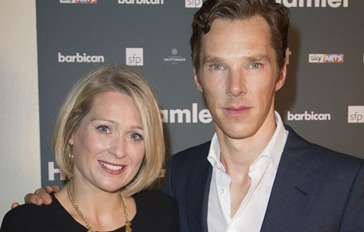
I’ve done a section on why I think Eurus is the most repressed part of Sherlock’s psyche, and his traumatic barrier to love and life – I sometimes glibly refer to this as gay trauma, but that’s its essence. The similarity between Brooke and Cumberbatch in this scene is really compelling, looking the same but lit and dressed in opposite colours. Similarity and difference both highlighted. Even nicer, the white of Sherlock’s shirt is the same notable brightness as Eurus’s uniform, but it’s hidden under his jacket – a visual metaphor for her being hidden inside him.
Eurus gives Sherlock a Stradivarius as a gift. This should set alarm bells ringing for anybody who has seen TPLoSH. If you haven’t seen The Private Life of Sherlock Holmes, please do so immediately because my God you are missing out, but TLDR – a Russian ballerina offers Holmes a Stradivarius to have sex with her so she can have a brainy child, and he declines because he’s gay. (This is not just my interpretation, this is genuinely what happens, just to be clear.) Eurus giving Sherlock a Stradivarius is a deliberate callback to the film which Mofftiss cite as their biggest inspiration; just like the ballerina tempted Holmes to feign heterosexuality, so does Eurus – and both make clear that it’s not without its rewards, which is unfortunately true for real life as well. This moment in Sherlock’s psyche also recalls the desperate unrequitedness of Holmes’s love for Watson in TPLoSH, a reference to our Sherlock’s deepest fear at the moment – he has realised his importance but not John’s romantic/sexual love for him, as we’ll see. So here, trauma!Eurus isn’t just referencing closetedness, but is actively drawing on a history of character repression with which to torment Sherlock – metafictionality at its finest.
The Stradivarius is specifically associated with closetedness, but violins more generally in the show are used to show expressions of love that can’t be voiced out loud – think of John and Mary’s wedding, or the desperate bowing of ASiB. So Eurus, gay trauma that she is, telling Sherlock that she taught him to play is a moment of distinct pain – she is the reason he can’t speak his love aloud, but instead has to speak in signs.
When Sherlock plays ‘him’, rather than Bach, to Eurus (he has a big Bach thing with Moriarty in s2, take from that what you will because I don’t know!), he’s playing Irene Adler’s theme. As a fandom, we’ve generally agreed on associating Irene’s theme with sexual love, which ties in nicely with Eurus’s question – has Sherlock had sex? It’s unanswered. At the end of ASiB, Irene calls Sherlock the virgin, suggesting that he hasn’t.
My favourite moment in s4 without a doubt is Jim dancing to I Want To Break Free. I know it’s the most boring thing to say, but my two greatest loves are Andrew Scott and Freddie Mercury, so it was like Christmas. Here it is also Christmas, but there are two possible timelines. I hypothesise that this refers to Christmas 2010, but it’s absolutely conceivable that it could be Christmas 2009. If we acknowledge that Sherlock is in a coma in 2014, then five years ago is Christmas 2009; however, given that we’ve jumped to 2015 in dream time, I’m going to make the guess that Jim’s visit to Sherrinford is supposed to take place in 2010. This ties up with the idea that this is when Moriarty first started taking an interest in Sherlock, who had never heard of him before ASiP, particularly as this is all in the EMP.
I firmly believe that Jim represents the fear that John is in danger – I highlight this in the chapter on HLV, where you’ll recall we first encounter Jim in the EMP and he sends Sherlock on his journey through the EMP with the words John Watson is definitely in danger – a pretty big sign. Even without this, though, his biggest threat to Sherlock has always been hurting John, whether in TRF or with the idea of burning the heart out of him with Semtex. It’s not unreasonable then to assume that MP!Jim first getting inside Sherlock’s subconscious to represent this fear happens in 2010, when he first meets John. He slips in and stays there, and he melds with Eurus. We see this in the powerful visual of the two of them dancing in front of the glass as Jim’s image slowly becomes Eurus’s reflection – the fear of John dying embeds itself into the gay trauma that Sherlock has stored up, even without him realising it. This ties in nicely with the choice of I Want to Break Free, which is famous for its use of drag in the music video – Jim melding into Eurus is the dark side of queer genderbending that we hate to see. It’s also a pretty fitting song name for an intensifying of repressed gay trauma, even without the association with queer king Mercury.
[A side note to all of this – there were wonderful TEH metas about trains in tunnels being sexual, which isn’t just a tjlc thing but is a well-established idea in cinema – Moriarty’s consistent train noises here seem like a horrifyingly inverted version of that sexual longing.]
Task 1 – The Six Thatchers
The governor is set up as a mirror for John in this task, which provides some helpful context for the episode as a whole. Heart!John makes this comparison himself, by drawing out the similarity between the situation with the governor’s wife and his with Mary, though in this case the governor does kill himself because of his wife – or so it seems. The suicidal instinct matches with everything we’ve learned about John in s4, but I want to hypothesise, perhaps tenuously, that he’s more connected with Eurus than we might think. We know that Eurus has had control of the governor for quite some time, and one of the things we hear her saying to the governor in the background of the interrogations is that he shouldn’t trust his wife. This is an odd thing to pepper into the background when he’s about to commit suicide for her, and perhaps suggests that he’s more of Eurus’s pawn than he lets on, though I grant this may be spurious.
The idea that he distrusts his wife because of Eurus is important, however, because we’ve already seen John engage with Eurus in various forms, but this seems like an extension of E; Eurus, aka Sherlock’s hidden self, has been making John doubt Mary, even before she shoots Sherlock. John cannot know she’s a spy at this point, so it’s unlikely he’s doubting her goodwill; he’s simply doubting her.
Before we look at how the actual task impacts the governor and how that illustrates what’s really going on in TST, it’s worth pointing out that it is the governor’s engagement with Eurus which prompts the entire shutdown of Sherrinford and forces Sherlock (with brain!Mycroft and heart!John ever at his side, of course) to engage once and for all with Eurus. This points to everything that s4 has been telling us – that Sherlock’s understanding of the relationship between him and John, including his power to save him (we’re going to see the governor play the foil here) is what sends his brain into stay-alive-overdrive. Sherrinford is the peak of this.
Summary of the task, for those who hate TFP: Sherlock is given a gun and told he can pick either John or Mycroft to kill the governor, otherwise the governor’s wife will be killed by Eurus. As I’ve written about in its chapters, TST is about Sherlock trying to get to the bottom of Mary and why she tried to kill him – and, of course, the impact this will have on John. In brief, by displacing the shot onto Mary in his mind, he’s discounting his own importance and instead thinking about what it will mean for John to lose Mary. His greatest fear is that losing Mary will break John, and it isn’t until the end of TLD that he recognises that the return of John’s suicidal ideation isn’t over Mary, but over him. TFP presents the horror version, the version of TST that Sherlock’s trauma wants him to believe but which he has to overcome. In this case, Mycroft and John resolve to keep the governor alive in their passivity, but that passivity – Sherlock’s coma – is not enough to keep the governor from killing himself over Mary. This is the most feared outcome from Mary’s death that Sherlock can think of – his fear of losing John combined with John’s love of Mary, which in TST Sherlock is still taking as read.
Double naming in this show should never be neglected, and in this case we learn shortly before the governor dies that his name is David. Again, the dramatic manner in which we learn this (on the moment of execution) draws our attention to it – we know another David in this show.
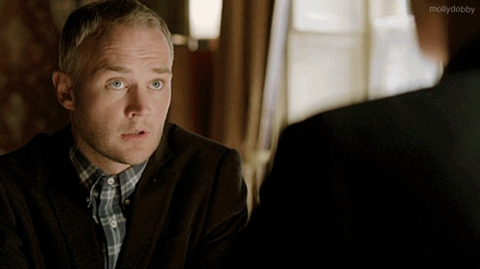
Yup – Mary's ex who’s still in love with her from TSoT. So even though Sherlock is experiencing the panic of John killing himself for loss of Mary, his subconscious is still pointing out to him that that’s not what’s happening here. This mirror version of John that he has set up, who is broken by the loss of Mary as Sherlock fears in TST, is actually the other man in Mary’s life – even with Eurus forcing the worst possible scenario onto him, this still can’t quite fit John’s character. And so we move onto the second task.
Task 2 – The Lying Detective
This section of the Sherrinford saga is the three Garridebs, the closest thing that the fandom has ever got to a collective trauma. I do think, however, that it’s fully reclaimable for tjlc and means the same as we always wanted it to; I also think that it’s possibly the most gutting part of Eurus’s metatfictional power play.
If you haven’t read The Adventure of the Three Garridebs, it’s quite short and the most johnlocky of the Holmes canon, so I’d thoroughly recommend. For the purposes of mapping bbc!verse onto acd!verse, however, here’s the incredibly short version. A man called Evans wants to burgle Nathan Garrideb, so he calls himself John Garrideb and writes an advertisement from a man called Alexander Hamilton Garrideb (make of that what you will, hamilstans) declaring that he wants to bequeath his fortune to three Garridebs. “John” gets someone to pretend to be a Howard Garrideb to get Nathan out of the house to meet him – he comes to burgle the house but Holmes and Watson are lying in wait. He shoots Watson, and Holmes thinks Watson is seriously injured and so we have this wonderful section:
“You’re not hurt, Watson? For God’s sake, say you are not hurt!”
It was worth a wound–it was worth many wounds–to know the depth of loyalty and love which lay behind that cold mask. The clear, hard eyes were dimmed for a moment, and the firm lips were shaking. For the one and only time I caught a glimpse of a great heart as well as of a great brain. All my years of humble but single-minded service culminated in that moment of revelation.
“It’s nothing, Holmes. It’s a mere scratch.”
He had ripped up my trousers with his pocket-knife.
“You are right,” he cried with an immense sigh of relief. “It is quite superficial.” His face set like flint as he glared at our prisoner, who was sitting up with a dazed face. “By the Lord, it is as well for you. If you had killed Watson, you would not have got out of this room alive. Now, sir, what have you to say for yourself?”
Mofftiss have referenced this moment as being the greatest in the Holmes canon for them, the moment when we see the depth of Holmes’s affection for Watson, and so it seems odd to waste it on such a tiny moment in TFP. Many fans, myself included, were really upset to see Eurus drop all three Garridebs into the sea, the implication being that tjlc would never be real, and it was that moment that caused many (including me) to walk away. I came back, obviously, but I completely understand why you wouldn’t. However, I want to map one Garridebs story onto the other to show how they might match up.
The Garridebs that Eurus presents us with are not the three Garridebs from the story. In the story, there are three physically present Garridebs – Nathan, John and Howard – although admittedly only Nathan is an actual Garrideb. Alexander was completely invented by John and existed only in a newspaper advertisement. Evans, alias John Garrideb, is the criminal in the Garridebs story; Alexander is an invention.
So – what happens if we substitute John for Alex in bbc!verse, as in canon they are the same person? This is interesting, because double-naming means that John becomes the killer. Whilst it’s true that John Garrideb is known as Killer Evans for his murder of a counterfeiter back in America, in canon he is done for attempted murder – of John Watson, of course. Here we have a situation where a John is set up killing John. This is exacerbated by the victim in bbc!verse being called Evans; Roger Prescott, the counterfeiter, would have been a much more canonical nod to the books, so we can assume that the choice of Evans is therefore significant. It should be noted that Evans and John/Alex Garrideb are the same person in acd!canon - so killing Evans is a representation of suicide. But, in case we weren’t there yet, the reason that Evans took the name ‘John’ is acd!canon is very likely to be because Evan is Welsh for John – so whatever way you look at this situation, you have Sherlock deducing John killing John.
This is, of course, exactly what Sherlock deduces at the end of TLD, far too slow, when we see Eurus shoot John in an exact mirror of the shot from TST – I explained in a previous chapter why this means that John is suicidal without Sherlock. However, much like the passivity of Sherlock, John and Mycroft in the first task, here we see that Sherlock’s act of deduction is good, but can’t actually save anyone; Eurus kills off our Garridebs moment as Sherlock is left to watch, and it’s notable that heart!John is the most distressed about this. Remember, in the first task Eurus left Sherlock with an image of a John who was suicidally devoted to Mary, and although the Garridebs moment is one which metafictionally highlights the relationship between Sherlock and John, she’s still presenting him with a Garridebs moment in which he is fundamentally unable to save John. This is a direct result of the Redbeard trauma that Sherlock has experienced – helplessness is key to that, and this is what Eurus has come to represent in his psyche. But – Eurus isn’t real, Eurus is testing Sherlock, trauma trying to bring him down, and Sherlock’s job in TFP is to break through the walls that his consciousness has set up for him.
The power in Sherlock saying I condemn Alex Garrideb is heartbreaking, then, because it is Sherlock recognising that he is the reason that John is going to die. Eurus is there to make him confront that reality, which she explicitly makes him do. We get the split-second moment where he thinks he’s saved Alex, and then he’s plunged into the sea – but remember, this is Eurus taunting Sherlock, presenting him with worst-possible-scenarios. TFP is set up as a game for a reason – it is a series of hypotheses cast in Sherlock’s mind by his trauma that he has to break through one by one. Remember, although she’s ostensibly trying to hurt Sherlock, Eurus’s ‘extra’ murders in the first two tasks are aimed at hurting John, which wouldn’t make sense if he weren’t the mp version of Sherlock’s heart.
Task 3 – The Final Problem
Pretty much straight after this episode aired, people were pointing out that Molly is a clear John mirror and that pretty much all of the deductions Sherlock makes here could be about John. Again, we’re seeing Sherlock’s emotions being resolved in a heterosexual context – the presence of Eurus means that he’s unable to process them in their real, queer form. However, if we take Molly to be a stand-in for John in this scene, it may tell us what TFP is about – and the scenario that Eurus presents will be the worst one, the thing that is causing Sherlock the most pain.
TLD/the previous task have shown us that John is in imminent danger, so the transition to Molly Hooper’s flat being rigged with bombs is not a difficult one; we must assume this to be the suicidal ideation that we’ve just deduced. The time limit suggests that Sherlock is running out of time to save him (fucking right he fell into a coma SIX YEARS AGO). Putting Molly in a bad mood isn’t really necessary for this scene – they make her seem a lot more depressed than she would necessarily need to be, and they emphasise her aloneness and her ability to push people away, which isn’t something we know Molly to do. These traits are all much more important in the context of a suicidal John – they paint a much clearer picture of someone who is depressed and alone than we really need for this scene, where it’s not relevant to the surface plot.
Sherlock and the audience believe he has won this task, but of course he hasn’t - there were never any explosives rigged up in Molly’s flat, and it was a ruse to destroy his relationship with Molly. This is what he fears then – what if he’s wrong? What if coming back to life because he loves John won’t save him – it will destroy him and their relationship? The problem to be wrestled with is how to save John – according to the symmetry of these tasks, that is the final problem. We know that the scenario Eurus has presented isn’t real, but Sherlock doesn’t; he is being held up by his inability to cope with interpersonal relationships, and to get to the bottom of that we’re going to need to understand what he’s been repressing – part 3 of this meta.
There’s a wonderful shot just as Sherlock is destroying Molly’s coffin which zooms up and out through a ceiling window, all the way above Sherrinford, as though to emphasise not how remote Sherrinford is but just how deep inside it Sherlock is. Given what we know about the height metaphor as well as the water metaphor, this shot is a pretty clear way of telling us – this is as deep inside Sherlock’s mind as we go, this is the nub. But Sherlock smashing up the coffin has another powerful connotation – he's refusing death. In terms of metaphor, he’s refusing John’s death – there will be no small coffin, because he will not let it happen – but the visual of him smashing the coffin also suggests that he is rejecting his own death. The two are, of course, inextricably linked. Our boys’ lives are tied together.
Epilogue: The Hunger Games
I can’t watch this without thinking of The Hunger Games, I just can’t! But regardless of how much Sherlock seems like Katniss in this section, let’s press on. I don’t count this as one of the typical tasks, because this isn’t Eurus presenting a ‘haha I tricked you scenario’ - far from it. This is Sherlock’s way into unlocking his repression. The key takeaway from this scene, as we’ll see is that trauma has hurt Sherlock, and it’s going to try pretty hard here to mutilate him – but it can’t kill him.
We get a great line from Sherlock at the beginning of this, where he tells John that the way Eurus is treating him isn’t torture, it’s vivisection. Because it’s an experiment? Perhaps. But the more logical way to phrase this would be that it isn’t vivisection, it’s torture. Torture is much more emotionally charged than vivisection as a phrase – from a writer’s perspective, this phrasing is strange because it seems to negate rather than intensify the pain our characters are undergoing. Why, then, would vivisection be more important than torture? Well, put simply, vivisection is the act of cutting someone open and seeing what’s inside – and that’s what we’re doing. This isn’t just an analogy for experimenting on people, it’s an analogy for going literally inside somebody. In EMP world, then, these words are well chosen.
Sherlock is offered the choice – John or Mycroft? Heart or brain? We might initially think that this is Eurus pressuring Sherlock into death, but that’s not the case at all – we know from the early series that Sherlock has survived before (although very unhappily) with just one of these two dominating the other. It has taken his EMP journey to unite them into a functioning entity, and Eurus is bent on destroying that, mutilating either his emotional capacity or his reasoning, the two parts that make him human. This is a good sign, as well, that trauma has been acting on Sherlock through the first three series, when his psyche was dominated by brain!Mycroft - Eurus is keen to revert to that state, when trauma had control. It is touching, then, that brain!Mycroft is willing to relinquish that control and leave Sherlock with his heart, perhaps because this new unity allows him to recognise how damaged the Sherlock he created was. We should also note that this diminishing of Sherlock’s heart is compared to his Lady Bracknell, which we know to be his repression of all Sherlock’s romantic/sexual impulses – except this time it’s less convincing, because his brain doesn’t believe it anymore. What is also devastating is heart!John’s lack of self-esteem or knowledge, the sense that he isn’t useful to Sherlock, which of course will be proven wrong.
[if anyone has thoughts on the white rectangle on the floor, do let me know. It’s bugging me!]
Mycroft says that he acknowledges there is a heart somewhere inside of him – again, this is emotionally powerful in the context of the brain/heart wrangling that we’ve seen inside the EMP. Just as Sherlock’s psyche has tried to compartmentalise them all this time and they’re finally working together, now there’s an acknowledgement that the compartmentalisation into personae is maybe inaccurate as well – brain!Mycroft’s pretence to be emotionally detached is not in fact correct, as we’ve been suspecting for a long time.
Brain!Mycroft also states that it’s his fault that this has all happened because he let Eurus converse with Jim. If you spend any time thinking about the Eurus + Jim meeting, like many elements of this show it doesn’t make sense. There isn’t a feasible way this could have been planned, recorded etc in five minutes, and although it’s true that Jim could have come back to shoot the videos under the governor’s supervision, it’s not clear why he’s so important. Unless he takes on the metaphorical significance that we’ve assigned him, letting Jim see Eurus seems pretty unimportant – he is only the garnishing on Eurus’s plan. Instead, Mycroft is at fault for letting John be in danger – not only did Sherlock misdeduce Mary (although we can lay the blame for that at the feet of heart!John - see meta on TST), his reasoning was blinded and so he missed John’s suicidal urges and the danger to his life. Brain!Mycroft holds himself responsible – all of these EMP deductions are way late, comprised of things Sherlock should have noticed when his brain wasn’t letting his heart in.
Five minutes. It took her five minutes to do this to all of us.
The lighting is dramatic, so I can’t properly gauge Ben’s expression at this moment, but his eyes look crinkled in confusion, just like they are at the moments when a sense of unreality starts to set in in TAB. Indeed, these aren’t very appropriate words for when you’re about to kill your brother; it’s like he’s being distracted, like there’s something important that he’s missing. Mofftiss are drawing attention to the sheer impossibility of the situation – and Sherlock’s nearly there. His Katniss Everdeen move, threatening to kill himself, is the recognition that his trauma doesn’t have that power – it can hurt him and deform him by twisting his psyche into unbalance, like it has before and like Eurus is trying to here, but it cannot kill him. We can see that Sherlock has risen above the one-sided dominance that he began the entire show with when Eurus shouts at him that he doesn’t know about Redbeard yet – that’s not going to change his mind today, but it’s a direct throwback to the days when it would have, in ASiP with the cabbie. Character development, folks.
The shot of Sherlock falling backwards into the dark water links to two aspects of the EMP. One is the continued metaphor of water to represent sinking into the depths of his mind. The water is so dark it looks oily – it could be argued that this is the oil that is corrupting the waters of his mind as we finally cut to the repressed memories. I quite like this reading, though I have little other oil imagery to link it to in the show. The other notable point is the slow-motion fall backwards – instead of showing Sherlock, John and Mycroft all falling, we cut to Sherlock falling backwards exactly like he did in HLV when he was shot by Mary. This is a really clear visual callback. Even though we’re going deeper, we’re linking back to the original shooting, back in reality, suggesting that this depth is paradoxically going to lead us back to the start. To go back to the oil imagery, don’t forget that oil floats on water – although it looks like we’re sinking, there’s a real sense that these repressed memories are actually pulling us to the surface of Sherlock’s subconscious, quite unlike the deep zoom out we saw when Sherlock was destroying the coffin.
And that’s it for part 2 of the TFP meta! Part 3/3 will deal with such highlights as John not being able to recognise bones and presumably getting his feet pulled off by chains. Good thing this is just a dream. See you then!
13 notes
·
View notes
Text
Dune Part 2: Major Actors They Could Cast in the Sequel
https://ift.tt/eA8V8J
This article contains Dune mythology spoilers.
After some uncertainty as to whether admired French Canadian director Denis Villeneuve would be able to complete his mission to adapt Dune into more than one movie, Legendary Pictures and Warner Bros. have struck a deal for Dune: Part Two, and there are now three major roles that need to be cast for it: Emperor Shaddam IV, Princess Irulan and Feyd-Rautha Harkonnen, who will all be key to the next part of the story when it’s released theatrically on October 20, 2023.
Though no casting news has yet been forthcoming, we’ve got a pretty good idea of the kind of actors who could slip into those three roles with ease…
Emperor Shaddam IV
Jake Gyllenhaal
During his relatively short and spectacular career thus far, director Denis Villeneuve has developed a small rotating troupe of actors he likes to work with. One he’s returned to several times is the star of his first Hollywood movie, Prisoners. That 2013 film came out as Jake Gyllenhaal was pivoting away from traditional leading men roles to some of the darkest and most fascinating work of his career, which included that nihilistic noir as well as Gyllenhaal and Villeneuve’s follow-up, the equally bleak Enemy (2013).
Teaming again with Gyllenhaal as the Padishah Emperor of the Imperium and head of House Corrino thus seems apt. Folks tend to forget that the spice melange slows aging and expands a lifespan, which might explain the youthful appearance of Paul’s parents as played by Oscar Isaac and Rebecca Ferguson. Gyllenhaal could continue that trend and bring a preening arrogance and sense of entitlement to the most powerful man in the Known Universe. After all, he already embodied peak grievance culture in Enemy and Nightcrawler (2014). Now imagine a whole galaxy having to bend to that neediness! – DC
Michael Stuhlbarg
The soft-spoken Michael Stuhlbarg often opts for troubled or anxious characters who could flip on a dime, and that’s just one of the reasons we think he could be in the running for the plum role of Emperor Shaddam IV in Dune: Part Two. We heard a lot of talk about the dastardly Emperor in the first movie, but one of the major ways that Denis Villeneuve’s adaptation differed from David Lynch’s version of the story was to have the character be spoken about but never seen, leaving the audience to assume he’ll show up with gusto in the sequel as Paul Atreides begins his rise to power.
Like Gyllenhaal, Stuhlbarg has worked with Villeneuve before in 2016’s Arrival and also, crucially, Timothée Chalamet in Luca Guadagnino’s Call Me by Your Name, where the two actors shared an unforgettable scene in a masterpiece of cinema that garnered them a string of awards nominations. Though it seems more likely that Dune: Part Two will cast a more A-List actor as the Emperor, don’t write off Stuhlbarg just yet. He may be the sequel’s dark horse. – KH
Princess Irulan
Elle Fanning
Princess Irulan is a difficult role to cast because she’ll likely have very little screen time but must communicate a lot in it: a regal sense of superiority, an ethereal otherworldliness, but also a cunning, scholarly intellect. There are several leading actresses who could inhabit that but perhaps because of her recent work on Hulu’s The Great, Elle Fanning springs to my mind as among the best choices.
As with her depiction of Catherine the Great, she can bring an internalized intelligence to the screen in short order while certainly also playing a character who expects she’s worthy of ruling the universe. Additionally, should Villeneuve ever be able to direct an adaptation of Dune Messiah, Fanning could quite easily portray the rising sense of anxiety and cracking fragility that will eventually come to the universe’s great historian. – DC
Maya Hawke
Twenty-three-year-old Maya Hawke shows no signs of slowing down, and the daughter of Uma Thurman and Ethan Hawke may well be on a path that sees her achieve roles beyond those that either of her parents have managed to snag over their long decades in the industry. Hawke tends to stand out in whatever film or TV show she shows up in, and although she’s best known to most as the sarcastic, ice cream-slinging Robin Buckley in Netflix’s flagship sci-fi series Stranger Things, the fact that Quentin Tarantino is championing her burgeoning career will likely work in her favor as she begins to strategically select meatier roles.
As Princess Irulan, Hawke would bring a brittle, cunning and thoughtful touch to the woman who may be required to marry Timothée Chalamet’s Paul Atreides as he ascends to power in Dune: Part Two. Should the story continue beyond the upcoming sequel and Paul commits to starting a family with his beloved concubine Chani, Hawke’s increasingly desperate and envious Irulan could also sway the audience to grant some sympathy for the character, despite her twisted deeds later in the Dune series. – KH
Feyd-Rautha Harkonnen
Tom Holland
The hardest of the three major new roles to cast, Feyd-Rautha Harkonnen is essentially Paul Atreides’ dark doppelgänger; the man he could’ve become if raised under the vile Baron Harkonnen’s tutelage. And given his predilection for indulging in gladiatorial fights where his enslaved foes have been handicapped to lose, one half wishes they could de-age Gladiator’s Joaquin Phoenix for the part.
Alas, that is not to be, and one has to find the anti-Timothée Chalamet for the role. In terms of appearance that wouldn’t seem to immediately suggest Tom Holland. However, the pair have an amusing shared history having gone after the same roles in the past, including Spider-Man, and they’ve both worked opposite Zendaya. Holland would obviously bring in an even larger young fanbase to the sequel, and one can speculate that the actor would enjoy playing a right sneaky bastard after so many years as a happy-go-lucky do-gooder in the public zeitgeist. Portraying a nasty piece of work in a major franchise would be a good way to shake off the pop culture cobwebs for the actor, and give Dune: Part Two an interesting dynamic between two of the more popular leading men under the age of 27. – DC
Fred Hechinger
Many wouldn’t have been able to pick Fred Hechinger out of a line-up before the young actor exploded onto the scene this year. But the combined releases of The Woman in the Window, the Fear Street trilogy and HBO’s The White Lotus have catapulted him into the spotlight, and that’s set to continue in 2022 with the highly anticipated and much-contested Pam & Tommy on Hulu, which charts the relationship between Pamela Anderson (Lily James) and Tommy Lee (Sebastian Stan) following the release of their infamous sex tape. Hechinger is playing grimy porn king Seth Warshavsky in what’s sure to be a revoltingly memorable role.
Having broken out in Bo Burnham’s acclaimed indie Eighth Grade, Hechinger has an acute softness to him tinged with a certain edge that’s hard to pin down, but that some have described as an “old soul”, and he most reminds us of Michael Pitt in his Funny Games and The Dreamers era. He could be an unexpected but perfect choice for the twisted and arrogant Feyd-Rautha Harkonnen in Dune: Part Two. Plus, he’s really mastered the old “curly fringe in the eyes” look, so he could go toe-to-toe (or hair-to-hair) with Timothée Chalamet’s Paul in the sequel. – KH
cnx.cmd.push(function() { cnx({ playerId: "106e33c0-3911-473c-b599-b1426db57530", }).render("0270c398a82f44f49c23c16122516796"); });
The post Dune Part 2: Major Actors They Could Cast in the Sequel appeared first on Den of Geek.
from Den of Geek https://ift.tt/3vTkvmA
3 notes
·
View notes
Text
Saturday Home Cinema: Mulan (2020) - A very honest review!

I just had to write this review because Mulan is one of my heroes and I’m a huge fan of the original Disney Mulan (1998). I saw the movie for the first time as a kid when I had trouble feeling integrated and was daily bullied at school. I re-watched it again and again and again until I was able to learn by heart the script and all the songs in German (and later on, even in English). I just saw so much of myself in Mulan (maybe except for the fact that I’m not as beautiful or witty as she is). I too always felt out of place and I couldn’t be my true self and I was never very ladylike either. I also looked up at her and saw her as a role model. Sometimes I thought that if I stared long enough at my reflection in the mirror, it’d show me my true self - and I’m still waiting to this day… Disney’s 1998 version of Mulan was and still is my favourite Disney movie.
> SPOILER ALERT AHEAD!! <
The best thing about this movie is the soundtrack, especially at the end. Christina Aguilera was the right choice to sing Reflection and Loyal Brave True. The goosebumps her voice gives, I can’t even describe how extraordinary her voice is. In the end credits, you can listen to the English version of Reflection as well as the Chinese version (sadly sung by Liu Yifei ¬¬). It’s worth to watch the end credits and listen to the songs.
*My suggestion: Stop whatever you’re doing. Put on some headphones (even better if they’re noise-cancelling), close your eyes, play the song Reflection song (and Loyal Brave True if you feel like it) by Christina Aguilera, no distractions no interruptions, forget about everything and everyone, let the song flow through your ears, mind, heart, body, and soul, and you will feel like you’re Mulan, especially when the drumming gets louder, it’s epically epic! (Sorry for the redundancy but it IS a remarkable song!)
I welcome the idea of wanting to take a classic and do something new, something fresh with it but humanity could’ve gone without this movie and they shouldn’t ask for $35 to watch it on Disney+ and sometimes a classical doesn’t need to be redone. Additionally, I can’t entirely understand what’s going on these past years not only with Disney but Hollywood and all other big movie production companies. It’s either remake of this classic or a 2nd/3rd sequel of a movie that doesn’t actually require a sequel but it’s still done anyway. Why even bother wasting big amounts of money to create a disaster? You’re better of donating that money to charity (or to me lol). The main thing that Disney has been doing lately are remakes of many of our childhood movies Aladdin, Beauty and the Beast, Dumbo, The Jungle Book, The Lion King, among others, and now Mulan. Some have a few good parts in them but they still can’t and never will compare to the original. Why is there no originality and innovation anymore? Have they run out of ideas? Furthermore, let’s be honest people will always compare the remake (either consciously or unconsciously) with the original because there are less than a dozen movies where the remake either was (almost) as good as the original much less better than the original. The movie Mulan (2020) had a massive budget and is the most expensive film made by a female director (Niki Caro), yet how they made it, the battle sequences and CGI effects, etc. they’re all crappy.
Budgets of all Mulan interpretations:
Mulan (1998) - $90 million > Directed by Tony Bancroft and Barry Cook. Made $304.3 million in the box office
Hua Mulan (2009) - $12 million > Directed by Jingle Ma. Sadly, made only $1.8 million in the box office. It deserved more love!
Mulan (2020) - $200 million(!!) > All that budget was a waste!
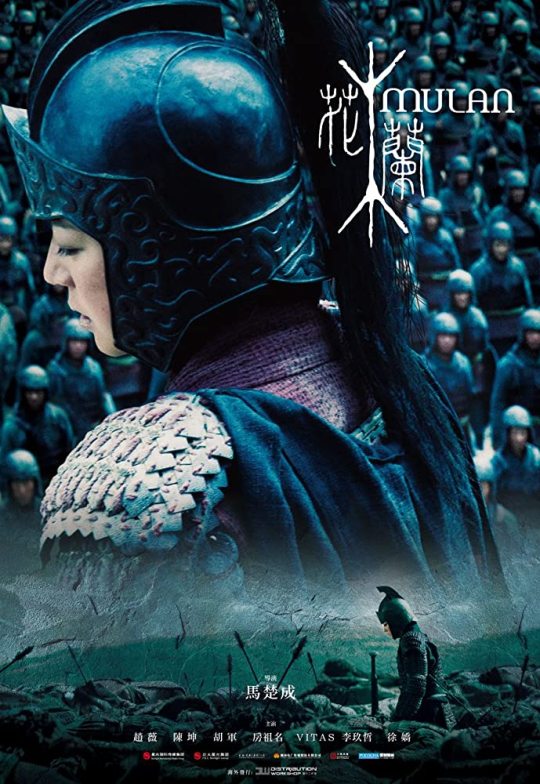
I’ve seen all three versions. The 1998 version is for everybody and it’s funny and you feel with the characters and the film. Let’s be honest, the granny is one of the best characters, most of us have or had a granny like that in our lives. The 2nd one is a 2-hour long movie, a more mature adaption which illustrates the ugly harsh truth about war and the loss and death it brings with it and that there’s nothing funny or cool about it. This one is not suitable for children. You feel with the characters and their sacrifices and they also develop along the movie. I can only recommend to watch this version if you haven’t. And the latest one is a disgrace.
I’m a bit confused as to what the message of the movie is. On one hand, it tells you shouldn’t hide your inner beauty, you shouldn’t hide who you are, you shouldn’t hide your abilities, you shouldn’t try to hide who you truly are in order to conform to what the world/society wants you to be or who you should be, let your true self shine and be yourself and don’t allow anyone to tell you that you’re inferior just because they think/say you are. This is something powerful and admirable but, on the other hand, at the same time, it tells you that you can only do that if you are the chosen one. Let me explain... In the beginning, we see Mulan as a little girl chasing a chicken up to the roofs of the houses at the village where she lives. Basically, she’s born as a one-woman army (almost deus ex machina) and doesn’t require any further training which is total and utter rubbish. She has all the skills because of her powerful chi (vital life force energy) but has to underplay them because it’s not very ladylike to behave like she wants to and she still underplays them when she trains with the soldiers so as to keep a low profile. Her being so powerful from the beginning makes me feel alienated from her and I can’t empathise with her. It’s also not very realistic, nobody is born with their abilities fully developed. For example, even Bruce Lee had to train hard to get where he got and he wasn’t the only one.
The original version shows us a regular girl, at times clumsy (which is a cliché but we still liked it) and when she’s confronted with new situations, she analyses them and finds a quick canny solution to them. She also has to train her body and mind to get to the peak of her potential and accomplish what nobody else could in her time, and here the character is done from the start of the movie and the only thing she has to do is choose not to hide her chi anymore. This tells us that you don’t have to work hard to achieve your dreams whereas in reality you actually do have to work your butt off!
I’m not a fan of the leading actress they chose for Mulan, aka Liu Yifei, not only because she’s a police brutality supporter according to her controversial tweets a while back - this already makes her unworthy to portray Mulan who is the complete opposite - but also because she didn’t do a good job at depicting this great role. Mulan is a role model for every girl and woman and it’s a massive contradiction if a woman who agrees to the atrocious police methods impersonates her role. What message do we send out to every girl out in the world? In her acting she’s this blank and hollow person through the movie and transmits no emotion whatsoever - not even when she cries. This also makes it difficult for me to identify myself with her. She’s this wooden plank, she is and stays a blank canvas through the whole movie with no growth in her character and it’s frustrating having to see this because the character of Mulan isn’t at all like this. Mulan experiences many emotions from the moment where she makes the decision to enlist so her father doesn’t have to or when she experiences the loss of her comrades or has to kill someone for the first time, etc. she suffers along her journey and all this changes her but you see nothing of it in Liu Yifei’s Mulan.
In the Disney version, there are some crucial moments that are missing in the new one. For instance, the most crucial one is the moment where Mulan decides to go to war. If you remember the animation one, she’s sitting in the rain by the dragon statue and at that moment makes a decision that could kill her or worse bring dishonour to herself and her entire family (including ancestors) which was far worse than death during that time! She gets up, marches to the altar of her ancestors, takes her father’s sword and cuts her hair (I know men had long hair back then too but still), puts on the armour and goes to war. All this while being accompanied by an epic song written by Jerry Goldsmith called Haircut. This is one of the most intense and dramatic moments in the movie and in all Disney movies! You can understand and feel the importance of this decision for the character and you feel the weight of it! In the 2020 one, she takes the sword and the next shot presents her already with the armour on - there’s zero dramatic impact here. That was a great missed opportunity!! By omitting important scenes and their dramatic impacts like this one that are essential to the story and to the characters, to their development and their journey throughout the story and you really need to rely on the original from 1998 to have this context.
The battle scenes are like many modern movies: lots of action, lots of moving (too fast-moving), a few amazing fighting moves and fights but not showed entirely. I at least expected some similar quality, like we’ve seen in films such as Hero (2002), House of Flying Daggers (2004), and Tiger & Dragon (2020) to name a few. Sadly, these movies had better fight scenes quality than Mulan which were filmed in high frame rate but over-edited with action that is negatively frenetic and have artificial CGI effects (even the CGI effects in Independence Day were better - I’m watching the movie while writing this). We’re in the 21st century with great advances in technology and movies are given big budgets (particularly Hollywood films), yet despite all this, most movies end up with CGI effects from another era. How come this happens over and over? In this one, we see people running too fast, horses running too fast, and they’re all like a big mass of headless chickens and you don’t know exactly what is happening where. All this fast running, the constant cut and paste of scenes looks all too modern and doesn’t fit the current time period of the movie and it surely doesn’t transmit the way of fighting of that period.
Moreover, we get lots of flashback-lesson learning scenes throughout the movie. This is another fashion in movies lately, playing the film in the present time while at the same time jumping back and forth between flashbacks. It spends a good portion of the movie with these flashbacks. This is not a big issue and admirable per se but when these scenes are insignificant because they’re glossed over and transmitted without zilch emotion, then why even bother to include them in the first instance?
As a last comment, I like the fact that they hired Chinese actors and actresses for the movie (although I don’t know why it had to be in English, I’d have preferred it to be in Chinese, it’s not like we’re allergic to subtitles - unless they’re not done properly), some of them of renewed name, like Gong Li, Rosalind Chao (I loved her in The Joy Luck Club), Jet Li, Donnie Yen (legendary Ip Man), Jason Scott Lee (saw him in Dragon: The Bruce Lee Story), Tzi Ma but they won’t be able to save the movie even with a great cast like this one.
#disney mulan#disney mulan 2020#mulan live action#saturday home cinema#boycott mulan#don't watch it#don't watch mulan#don't watch mulan 2020#disney should be ashamed#honest review#a very honest review#film night#movie night
59 notes
·
View notes
Video
youtube
Stan Ridgway is best remembered as the guy from Wall of Voodoo, and Wall of Voodoo are best remembered as the guys from “Mexican Radio.” But there’s a whole lot more to Ridgway’s solo career, which began with 1986′s The Big Heat--Americana, epic narratives, and a whole lot of digital synth. (Transcript below the break!)
Welcome to Passionate Reply, and welcome to Great Albums! Today, we’ll be looking at an often overlooked solo debut: Stan Ridgway’s The Big Heat, first released in 1986.
Stan Ridgway is best remembered as the original frontman of Wall of Voodoo, and Wall of Voodoo, in turn, are best remembered for the single “Mexican Radio,” a landmark bit of New Wave eclecticism that became an unlikely hit thanks in large part to heavy rotation on MTV. That said, like a lot of ostensible “one-hit wonders,” the span of Ridgway’s artistic career is quite a bit more varied and more interesting than this solitary recording might suggest. While I don’t believe that “Mexican Radio” is simply a novelty song that can easily be dismissed, I will set it aside for the time being, because any attempt to cover the rest of Stan Ridgway’s work is probably better off without worrying about it. Instead, let’s take a look at his first bona fide solo release: the 1983 single, “Don’t Box Me In.”
Music: “Don’t Box Me In”
“Don’t Box Me In” was a collaboration between Ridgway and percussionist Stewart Copeland, then known chiefly for his work with the group The Police. While Copeland is now fairly well known for his work composing scores for cinema and video games, this was one of his first forays into that field: the soundtrack to Francis Ford Coppola’s film adaptation of Rumble Fish. Based on a novel by S. E. Hinton, most famous for The Outsiders, Rumble Fish was actually a tremendous flop for Coppola, perceived to be a bit too avant-garde for its own good, and Copeland’s percussion-led score for the film, experimental in its own right, certainly didn’t help that perception. Despite all of this, “Don’t Box Me In” managed to do fairly well for itself as a single, achieving substantial alternative radio play purely on its own merits. And merits it has, weaving together the experience of a fish trapped in a tiny bowl with a more universalized sense of human ennui, being overlooked and underestimated by everyone around you. Not to be underestimated himself, Ridgway has not only written these evocative lyrics, but delivers them in a manner that shows a complexity beyond his semi-affected Western twang, conveying fragility and uncertainty alongside indignation and determinedness. This is also the version of Stan Ridgway whom we meet when we listen to The Big Heat.
Music: “Camouflage”
Despite being the very last single released from The Big Heat, the eerie war yarn “Camouflage” would go on to be the most successful track from the album, and Ridgway’s best-known hit as a solo artist. Perhaps surprisingly, the single was largely snubbed in the charts of Ridgway’s native USA, becoming a much bigger hit throughout Europe. While playing the harmonica and sporting a bolo tie, Ridgway seems to almost play the character of the quintessential American, and perhaps it’s that quality that’s caused this apparent rift. Is it necessary to analyze his art through the lens of exoticism in order to find it appealing?
It’s a hard question for me to answer, personally--I might be from the US myself, but at the same time, the vast majority of the music I listen to is European, as a natural consequence of being chiefly a devotee of electronic music. There is still a sort of novelty factor I find in Ridgway’s work. I remain in awe of the fact that a musical genius exists who uses a hard R, and says “huh?” instead of “pardon me?” But, of course, I am amazed by this moreso because it makes me feel “represented,” for once, in a musical tradition which is important to me. If people from Britain’s crumbling industrial centers like Sheffield and Manchester have made great electronic music, then surely synthesisers can also tell the stories of the American Rust Belt, where I come from? For that, we’ll have to step away from the sort of typified narrative of “Camouflage,” and take a listen to the album’s title track.
Music: “The Big Heat”
“Camouflage” told us a tale as old as time, in which a benevolent ghost offers one last act of aid to a vulnerable human being. The album’s title track, on the other hand, alludes to a particularly 20th Century form of storytelling: the detective drama and film noir, as hinted at by its allusion to the classic Fritz Lang film of the same title. Ridgway assumes the perspective of the hardboiled detective, hot on the trail of some mysterious quarry, and it is the innocent passers-by he seeks information from who respond with the song’s banal refrain: “Everybody wants another piece of pie today.” For as much as people have mocked Ridgway’s singing style over the years, you’ve got to appreciate his lilting delivery of this line here in the first verse, where it comes from the mouth of a female character.
It’s easy, of course, to see such apparent non sequitur lyrics in Ridgway’s oeuvre as merely ridiculous, as many quickly do with the likes of “Mexican Radio,” but the more you listen to him, the more his style begins to make sense. The instinct to find humour in things is deeply connected to the feeling of being surprised, and encountering the unexpected. Ridgway happens to be all about delivering the unexpected, and it’s precisely the surface-level absurdities and surprises his lyricism offers that make us think more deeply about the stories he tells. The title track of The Big Heat isn’t about pie, but rather the fact that everybody its characters encounter appears to be grasping for more out of life, and hungry for something else. It’s what drives criminals to transgress against the law, and it’s also, perhaps, what drives the detective to devote himself to the pursuit of the abstract principle of “justice.” To both the villain and the hero of this story, the civilians they brush past are little more than means to an end, despite their display of greater wisdom and insight into these issues than anyone else. Ridgway excels at conveying this sort of saintly everymannishness, and does so with similar gusto on the track “Pick It Up (And Put It In Your Pocket)”.
Music: “Pick It Up (And Put It In Your Pocket)”
“Pick It Up (And Put It In Your Pocket)” was actually not released as a single, which is perhaps surprising given its hooky quality and sprightly synth backdrop. While “Camouflage” is assembled chiefly from traditional instruments, with only a subtle intrusion of Yamaha DX-7 to remind you that it came out in 1986, many of the other tracks, like this one and the title track, are willing to double down on electronic influences, and ride the wave of “peak synth-pop” that was easily cresting by the mid-1980s. That aside, the central theme of “Pick It Up (And Put It In Your Pocket)” is the quotidian avariciousness one encounters among ordinary folk, and the psychological effects of living in a “mean world.” While the text mostly revolves around the idea of living in fear, and the paranoia of knowing that “everything changes hands when it hits the ground,” it reaches a climax by showing us an actual situation where this occurs: the pathetic figure of a filthy old man who finds a small bill in the road, and, in a fit of folk superstitiousness, is said to “thank the street.” The song’s tension lives between the bustle of the jealous ones, and the reality of life for those desperate enough to pick up money from the street. Like many of Ridgway’s greatest works, this track simultaneously portrays the mentality of the common man in a direct and serious manner, but also opens up room for it to be criticized. This everyman bystander persona is assumed more directly in the track “Drive, She Said.”
Music: “Drive, She Said”
While the album’s more electronic elements are its main draw, in my eyes, there are still a number of tracks that remain dominated by traditional instruments, “Drive, She Said” being a prime example of them. While narratives are always at the center of Ridgway’s work, “Drive, She Said” moves us away from omniscient narration like that of “Pick It Up (And Put It In Your Pocket)” and back into the mind of a specific and individualized narrator--in this case, a cab driver who somewhat reluctantly transports a bank robber, with whom he might also be falling in love. While it doesn’t have the supernatural implications of “Camouflage,” the two stories do seem to have much in common: an ordinary person meets someone who quickly reveals their extraordinary nature, and despite the brevity of their encounter, the protagonist is deeply affected, and perhaps changed, by the events. Much as “Pick It Up (And Put It In Your Pocket)” sees fit to shatter its apparent main premise, with an interlude that shifts the tempo of the music as well as introduces the contrasting figure of the old beggar, “Drive, She Said” introduces an interlude of its own: the driver’s reverie, in which he runs away with his enigmatic passenger. As in many of Ridgway’s tales, we must consider both the beauty of a wonderful dream, and its sheer impossibility.
On the cover of The Big Heat, we see a portrait of Stan Ridgway looking glum, which is not itself terribly unusual for an album cover, though the fact that he’s behind a metal fence certainly is. The main focus of the image seems to be Ridgway’s environment, a bleak industrial setting full of towering machinery, and no other traces of human beings. The absence of other figures in this scene draws attention to the scale of the machines, as well as the fact that in many parts of the US, including my own, it’s very common to see equipment like this that’s fallen into disuse and disrepair. Much as ruined aqueducts and palaces mark the places in Europe where the Roman Empire had once held fast, these sorts of derelict manufacturing facilities are a common sight in America, and serve as reminders of the squandered “American Century.” While many album covers have shown me places I like to imagine myself visiting, I don’t have to imagine what being here might be like, having grown up in a place whose pride left soon after the steel industry did. It strikes me as exactly the kind of setting that Ridgway’s narratives ought to take place in: dirty, simple, well-intentioned, doomed, and all-American.
Ridgway’s follow-up to The Big Heat would be 1989’s *Mosquitos,* an album that largely abandons the many synthesiser-driven compositions found in his earlier work. It’s hard to fault him for this decision, given how much the mainstream appeared to be souring on synth-pop and electronic rock by the end of the decade, but it does mean that this album offers little I’d want to listen to recreationally. That is, with the exception of its third and final single, “Goin’ Southbound,” a practically epic drama of small-town drug smugglers trying to survive, and one that fires on all cylinders when it comes to fiddles dueling with digital synths. This track feels like it would fit right in on The Big Heat, so if you’ve enjoyed this album, don’t miss it.
Music: “Goin’ Southbound”
My favourite track on The Big Heat is “Salesman,” which, to my surprise, received a small advance promo release without ever becoming a true single. The titular character, an unctuous but insecure traveling salesman, is as rich a narrating persona as any of the many in Ridgway’s catalogue, and I love the way the refrain just feels like a song you might make up while idly doing something else, silly and yet primal at the same time. It captures the feeling of living “on the edge of the ball,” enjoying the freedom of spontaneity, but also, perhaps, suffering for its enforced sloppiness. That’s everything for today, thanks for listening!
Music: “Salesman”
5 notes
·
View notes
Text
lockdown film no. 28 - Mr. Bean’s Holiday (2007) dir. Steve Bendelack
24/04/2020
because I am An Adult, this was the film that me and my parents decided to watch for my birthday this year. It was a thoroughly enjoyable evening given I hadn’t seen it in several years and we got a takeaway from the best pizza place around and my dad bought wildly overpriced vegan ben and Jerrys
- when mr bean wins the raffle its actually very heartwarming how happy everyone is for him
- THE TRAIN TRANSITION HOLY HELL
- im absolutely in love with all the the video camera footage they use
- “un café?” “oui” “du sucre?” “non” “you speak very good French” “gracias”
- last year for a film project we had to make a short film with only 20 words of dialogue and this is actually a great example of how to do it because he never really uses words its mainly just sounds
- the soundtrack in this is absolutely boss no lie
- i went on holiday with my friends last year to an island that was so small you could walk around the whole thing at least five times in a day, and also had basically no buildings. And so from there the concept of ��mr beaning it’ was born, where you pick where you want to go and walk in a straight line in that direction
- the fact that this was the first film I saw Willem Dafoe in is hilarious to me because he’s such a serious actor and then there’s this. I saw this, Spiderman and then Mississippi burning and man that really threw me off
- ties and vending machines are a health risk
- richard curtis worked on this ??
- the plateau de fruits de mer scene absolutely sent my entire family it is just the peak of comedy. Me and my mum saw the film for the first time in a cinema when I was about eight and it just gets us every time
- THE OYSTER WHEN IT MOVES
- apparently the guy who plays the waiter in that scene is a very celebrated actor in France and he’s done loads of serious stuff so this is another kind of Willem dafoe situation it seems
- the boy playing Stepan was Viktor in the series years and years and when I say that absolutely blew my mind when I found out
- the scene where Stepan copies mr bean and they’re crossing their legs is so cute and a bit of nice light humour before the real shit kicks in
- I know it wouldn’t work if they could call the dad straight away but the two numbers at the end are clearly 97
- THE HOTEL WORKER WITH THE PHONE WHAT PAIN THEY WERE SO CLOSE
- ohhhhhh the market scene. whoever came up with the idea for that should get an Oscar
- mans got some strong legs holding a squat for the whole of rondo alla turca
- i think the opera scene in the market (i don’t know the name of the piece) is one of the funniest scenes in the whole film if not in a lot of films. Its absolute class and I love how mr bean, who doesn’t speak a full sentence for the majority of the film all of a sudden knows every word to an Italian opera. Also the scene that they construct and play out is actually very emotional and they both end up dead but its still funny ?
- stepan really just yeeted the camera at a total stranger now that is some faith in humanity right there
- I wanna grab onto a car while riding someone else’s bike in the middle of the French countryside and go zOOM past the tour de France
- the chickens cluck in tune with the song and I personally am a huge fan of that
- I think rowan atkinsons face is made of rubber or something
- he goes into that little hut and the vehicles gradually get more and more absurd like tHIS IS HOW YOU DO COMEDY
- I don’t think they went into how fucking weird it would be to fall asleep and wake up under a cart in a French village that turns out to be under siege by nazis
- also, I know Carson Clay is meant to be a parody of a Hollywood director, but I just want to know what happens at the end of the advert. Does sabine end the war and appease the nazis with yoghurt?
- Une minuscule explosion?
- Sabine was super chill about them using her phone to call basically everyone in France
- the car scene with the matches has absolutely gone down in history. Literally every time were driving at night someone will mention that scene
- the French translator at Cannes was hilarious like clay said his bit, looked over at the guy, the guy sort of cringes (?) and goes “he says it is a very good film”
- all the scenes we see from playback time get me every time and I’m pretty sure its one of my dads favourite scenes
- nothingnothing nothing nothing n o t h i n g
- OHHHH when the fam gets back together ! So wholesome!
- la mer. what a tune, and all the things lining up so he can just walk straight down to the sea I lOVE
- oh man what a good film
- its just a great comfort film and its so funny but its really warm as well and its not cheesy but its really funny and I love it
#mr beans holiday#steve bendelack#rowan atkinson#mr bean#peter bennett-jones#tim bevan#eric fellner#hamish mccoll#robin driscoll#simon mcburney#richard curtis#emma de caunes#max baldry#howard goodall#baz irvine#tony cranstoun#willem dafoe#karel roden#jean rochefort#catherine hosmalin#urbain cancelier#stephane debac#julie ferrier#steve pemberton#lily atkinson#monsieur hulot#monsieur hulot's holiday#comedy#lockdown films#lockdown film no. 28
18 notes
·
View notes
Text
guys i just like, sit here and Cry thinking about the quality fucking content we got with 4x04. like i can’t even articulate the sheer Notebook level turned dark romantic drama and angst we got between elliot and tyrell. it’s truly the level of dumbassery, miscommunication, tension, good writing & rawness i NEED in a ship
not only is it fucking christmas, which like, is explicitly mentioned and verbalized which holds so many feelings & symbolism in and of itself (🙏🏻), but like... there’s so much more
tyrell talks to both robot and elliot in this episode, blatantly and individually. he turns to talk to each respective one (like the split scene w robot sitting on the guardrail w him and elliot walking off down the road) and that is just ...Peak fucking Poetic Cinema in terms of symbolic represention that tyrell knows who he’s talking to in reference to elliot’s alters. he knows elliot, and he knows when he’s “a different person” (quoting his confusion in s3 when he finds out about his alternate personalities). so like not only does that exist, but it’s also never actually been presented that way with any other character, so it’s really fucking unique and special imo.
then comes the fucking DIALOGUE that just obliterates any chance i had at being normal ever again. like “just be honest with me i can take it” “what is the point of all this?” - not only is elliot like, panicking & clearly deflecting bc he doesn’t want to open up and answer the question bc he’s terrified, but he doesn’t even dismiss the obvious romantic undertones? he knows exactly what tyrell means. it’s just romantic context. and it doesn’t even stop there. the most telling bit for me is “just answer the question, did you?” “tyrell you didn’t make it easy—“
YOU DIDN’T MAKE IT EASY
like is that not the most clichéd fucking emotional conflict buildup to a full blown lover’s spat you’ve ever heard??? YOU DIDN’T MAKE IT EASY- again not even dismissing that he still does regardless? or could? or tried to? it’s all just so seemless & romantically coded conversation and i gotta give a big 👏🏻 to sam esmail for it. he screwed us in the end but he said fuck hetero lives and made tyrelliot so blatantly romantic.
anyway tyrell does get his comeuppance and smack of reality for being an intimidating and capitalist vulture in the past when he realizes that elliot isn’t exactly head over heels for him, but they’re still such complimentary characters in the sense that the conversation itself & who tyrell is by nature still pushes elliot in ways he needs. he pops elliot’s safe bubble & forces him to admit the emotionality he does have, process it, and decide for himself shit.. maybe i do care more than i let on- maybe i can’t shut myself out from feeling.
it’s just.. when spending time together, it’s narratively impossible not to let them be each other’s reality check and foil (they got one ep together and all of this came flooding out as a result! like proof!!). to me, that is when you know you’ve struck gold w a pairing. and that’s also incidentally why creators chicken out & never actually put certain characters who have natural queer chemistry in scenes together, bc that chemistry is so obvious and undeniable that it could easily trump other narratives they’re trying to sell- like for example, making their characters heteronormative. i’ve seen it happen literally time and time again and i don’t get it bc they created these characters and yet they’re terrified of their possibilities??? anyway hlfkfk
like the “i’m going” “yeah.. go elliot..” “i will!” “yeah good” lmfao. hilarious bitter break up vibes? sign me the fuck up. quintessential romantic drama dialogue. and then they end up yelling at each other hlflgkkfd. like aside from interactions w robot, when has elliot ever actually cared enough about something to even flinch? and here he is screaming? with nothing between them but dead silence??? it’s fucking beautiful & this is such a CHARACTER-CENTRIC episode i wish the whole god damn show had the vibes of this ep!! this is my JAM and it was an absolute goldmine
and on top of it all, as an audience you know that elliot is beginning to lose himself (having gone totally off the deep end with fucking over olivia’s entire life) and yet there tyrell is, the key, screaming through the distance (that elliot both physically and metaphorically created) between them that he’s so in his own head that he’s losing sight of reality and what really matters: people, things, direction, feelings. i just.............. speechless.
tyrell is absolutely paramount to elliot’s sanity and emotionality and i mourn the fact that sam underused him. bc he creates such a centerpoint for elliot. and in giving a nod to the typical hero and villain dynamic, it works so well but with such a powerful twist of turning that dynamic on its head. they don’t actually hate each other and instead have grown fond of each other.
like elliot comes around, opens up and speaks softly again, admitting he shouldn’t and wouldn’t leave tyrell behind, that he is individually important and worth coming back for (something tyrell has never heard before from anyone! something he’s been searching for this whole series!) - building tyrells walls back up from nothing. and tyrell got a moment to be strong, & speak his mind/feelings which brought elliot out of his compulsive loop and took a sledgehammer to the concrete walls around his heart.
anyway i could go on for ages and also watch an entire show of just the two of them but this post is a nonsensical mess so take it how you will i’ll just be over here crying hlrlrkjfj
125 notes
·
View notes
Text
Top 15 First Watches of 2020
I’ve never been good at staying current on pop culture, and that became especially pronounced in 2020. A year where most of the anticipated theatrical releases were pushed to VOD (and the price nearly tripled) meant that a lot of flicks I was excited for got added to the end of the “Maybe Someday” watchlist.
But in this strange year, I did manage to watch 245 movies- and 195 of those were first-time watches. Some were new, only available on the (virtual) festival circuit. Some were Criterion mainstays, films I’m horrified to admit I hadn’t seen before. But this year, when movies cemented themself as my biggest joy, I began to really track what I watched- including a “top 5 first watches of the month” roundup for every month. These top 5s weren’t ranked, and weren’t even based on technical ability, strength of dialogue, or critical acclaim. They were just the 5 I loved the best.
So without further ado, here are my top 15 of the year- one selected from the top 5 of each month, with some bonus entries thrown in as well. As a general rule, I only included features on this list- I was fortunate enough to catch shorts that streamed at Chattanooga Film Fest, Celebration of Fantastic Fest, and more, but to add them to the running would have made writing this listicle absolutely impossible.
HONORABLE Honorable Mention: The Holiday. Inspired by the fine folks at Super Yaki, I finally watched this Nancy Meyers classic. Why is it two and a half hours long?! Why is that two and a half hours so significantly lacking in Jack Black?! The scenes that Black is in, though, really shine. This one is going to be a Christmas mainstay in the Disco household (and not just because I spent money on the DVD).
15: The Love Witch (Honorable Mention, April). This one came highly recommended to me by friends of all sorts, and like most of my 2020 first watches, I’m deeply embarrassed that it took me this long to get to it. Upon finally watching it, on a rainy Sunday, I described the movie in general (and the color palette, specifically) as “sumptuous,” which is one of the most complimentary visual descriptors I can bestow upon a movie. The plot felt a little convoluted at times, but I still found The Love Witch incredibly enjoyable and am hoping to explore more of writer-director Anna Biller’s filmography in 2021.
14: The Guest (Honorable Mention, October). The Guest is one of the few movies I watched multiple times this year- and the only one I watched twice in one week. From the sultry industrial soundtrack selections to the numerous visual nods to Halloween III: Season of the Witch, The guest was Extremely My Shit. The casting here is truly tremendous- especially Maika Monroe, who was similarly brilliant in It Follows. Also of note: Lance Reddick, one of my current favourite character actors.
13: The Fast and The Furious (Honorable Mention, May). 2 Fast 2 Furious (and its bespoke theme song, Act A Fool, by Ludacris) came out when I was in the 6th grade. Do you remember the music and movies that entered the world when you were in 6th grade? Do you have an inexplicable zealous love for them? 2F2F was the only film in the Fast Cinematic Universe I had seen for a long, long time. Then I saw Fate of the Furious. Then I bought the series box set, as a joke?? And then, slowly but then also all at once, I genuinely started to love this franchise. Some of them are truly ridiculous. Some of them are genuinely bad. But the first one? The Fast and The Furious (2001)? Timeless. Point Break updated and adapted for the early-aughts, The Fast and the Furious walked so The Italian Job (2003) could run. Without The Fast and The Furious, Paul Walker would just be “the guy from Tammy and The T-Rex” to millions of casual cinemagoers. The cultural impact of The Fast and The Furious simply cannot be denied!!
12: Come to Daddy (Top 5, July). Honestly, this is the exact flavor of bonkers bullshit I’ve grown to expect from Elijah Wood, and that is not an indictment. Wood’s genuine love for genre film is evident here, in what can only be described as an uncomfortable film of family, reunion, and redemption. The tense and abrasive first half gives way to a surprisingly relieving wave of violence and exposition in this critically-acclaimed flick.
11: The Stylist (Top 5, September). The feature-length debut of writer-director Jill Gevargizian, based off her short of the same name, is female-led horror that pays homage to genre mainstays like Maniac and Psycho while still being decidedly singular. Not only shot in Kansas City, but set in Kansas City, The Stylist made my midwestern heart happy. This is one that I really, really would have loved to see in a crowded theater auditorium, were this year a different one.
10: In The Mouth of Madness (Top 5, March). Despite being the beginning of pandemic awareness, March was a slow month for me, movie-wise (even though it’s not like I had anything else going on??). But I finally made time for this Carpenter classic, and I’m so happy I did. I’ve long been fascinated by stories about stories, and the people who find themselves trapped within those stories, and this one is truly, in the most basic sense of the word, horrifying. Sam Neill proves that he belongs in horror here, making his role in Event Horizon seem like a natural fit. Also a highlight: noted character actor David Warner, best known (to me) as “Billy Zane’s bodyguard guy in Titanic,” who never ever fails to be unsettling.
9: Profondo Rosso (Top 5, April). Before this year, my only Argento exposure was Suspiria (which is phenomenal), but Deep Red goes off the deep end in all the best ways. The score (by frequent Argento collaborators Goblin) is truly groovy. The number of twists and turns the plot takes is kind of mind-boggling, but also delightful. Daria Nicolodi (RIP) is at the top of her acting game here. This quickly became one of my beloved background movies- if I opened Shudder and Profondo Rosso was playing on one of their live-streaming channels, it stayed on while I was cleaning or cooking or paying bills. Profondo Rosso is a must-watch for those hoping to get into giallo.
8: Crimson Peak (Top 5, November). This one was definitely not what I was expecting, but it was GORGEOUS. I loved the world immediately (a Del Toro trademark, to be honest). As a longtime Pacific Rim stan, it made my heart happy to see Charlie Hunnam and Burn Gorman reunited under Guillermo Del Toro’s vision.
7: Palm Springs (Top 5, August). I am not typically a time-travel movie enthusiast- but I am a sucker for witty repartee and Andy Samberg. This one made me ugly-cry, which I should probably be a bit more ashamed to admit. August had a lot of really great first watches, but the Hulu exclusive takes the cake due to its novel premise, some truly heart-wrenching reveals, and the amazing casting (is there anything JK Simmons cant do?).
6: Scare Package (Top 5, May). Is there any format I love more than the horror anthology? While there have been so many over the years (Creepshow, All the Creatures Were Stirring), Scare Package might be my favourite of them all. A variety of fun and inventive stories combined with a genre-lovers dream of an overarching narrative make this one a must-see- in fact, it was the whole reason I bought a pass to this year’s online version of Chattanooga Film Fest. There’s a cameo here that absolutely knocked my socks off (and continued to do so even on repeat viewings). While the scares here are honestly minimal, Scare Package is a great love letter to the genre at large.
5: Do The Right Thing (Top 5, June). Yes, it took me until 2020 to watch Do The Right Thing for the first time. The palpable tension, the interwoven stories of Bed-Stuy’s residents, all seem timeless. Giancarlo Esposito is, as always, a joy to watch.
4: Knives Out (Top 5, February). “It’s a Rian Johnson whodunnit, duh,” states the SuperYaki! T-shirt famously worn by Jamie Lee Curtis, star of Knives Out (2019). This one has received worlds of critical acclaim, I truly do not know what I could even hope to add to the conversation. I want more old-school murder mystery cinema.
3: The VelociPastor (Top 5, January). It should be testimonial enough that The VelociPastor beat out Miss Americana, Netflix’s Taylor Swift documentary, as the top pick for January- but in case it isn’t, let me end 2020 the way I began it; by evangelizing the HECK out of this movie. Written and directed by up-and-coming triple-threat (Director/songwriter/prolific cat-photo-poster) Brendan Steere, The VelociPastor is a true love letter to genre cinema, complete with a big wink to the criminally underloved Miami Connection. Alyssa Kempinski shines as Carol, a doctor/lawyer/hooker with a heart of gold. The VelociPastor premiered in 2019 but gained tons of attention in 2020 (thanks in part to YouTube sensation Cody Ko)- attention that it truly deserves. A sequel is rumored to be in the works, but mark my words, anything to come from the imagination of Brendan Steere will be worth a watch.
2: Dinner in America (Top 5, October). I genuinely feel sorry for the other movies I watched in October (there were a lot) (they were all SO GOOD). Dinner in America, which I caught during the Nightstream hybrid festival, was not at all what I was expecting. While the other features were all very solidly genre flicks, this was…. A comedy? A modern love story?? I’mn honestly still not exactly sure, but I do know I loved every second of it. I laughed. I cried. I threw my hands up in the air exuberantly (in front of my laptop, looking like a true fool). I did not shut up about this movie online for weeks. I told anyone and everyone that Kyle Gallner is the most underrated actor of my generation and I still believe it! Dinner in America, the story of a punk band frontman who unwittingly takes refuge from the police in the home of his biggest fan, was an unexpectedly heartwarming tale of family, young love, and arson. Watch it as soon as you can.
1: Promising Young Woman (Top 5, December). This last-minute debut from Emerald Fennell, originally scheduled to hit theaters in April of this year, finally made its way to the big screen on Christmas Day, and became the 2020 entry on my annual “Christmas Day Trip to the Theater” list.* Carey Mulligan is an icon and deserves all of the awards for this. The soundtrack is sublime. The casting choices are truly incredible. While I have no doubt that the general themes of the movie will be polarizing, I absolutely loved this one- I sat in my car in the theater parking lot for a WHILE, considering just buying a ticket for the next showtime- that’s how badly I felt like I needed to see it again immediately. I look forward to writing its inevitable Criterion essay.
*Nobody else in rural iowa was interested in seeing this movie at noon on Christmas Day. I’m shocked.
2 notes
·
View notes
Text
Im sorry but,,,,,
That scene in the first Pitch Perfect movie when the Barden Bellas are performing in the Finals and the song transitions to Don’t You(forget about me) to specifically reference The Breakfast Club as Beca’s official apology to Jesse and statement that she is ready and wants to let him into her life and let him get close to her is literally peak poetic cinema and you can’t change my mind.
Beca had really been hit with nothing but straight facts from her father and took the time to apologize to everyone and then took the challenge of transforming the Bellas and going absolutely ape shit at the Finals and in that process she just HAD to add the most Iconic song from The Breakfast Club which came on in the final scene and the final scene was the first piece of the movie she had ever watched because JESSE showed it to her. And who did she have in mind when she added the song to her Capella mashup?
you guessed fucking right; JESSE
I could go on but I wont. so anyways,,,
Beca and Jesse is literally the only romantic subplot movie couple I accept and ship whole heartily and thats that.
THE END
#Pitch Perfect movie#pitch perfect#I know this isnt GT but ill get back to that in a min#ya pitch perfect is old but idc#ship#my ship#Beca and Jesse
62 notes
·
View notes